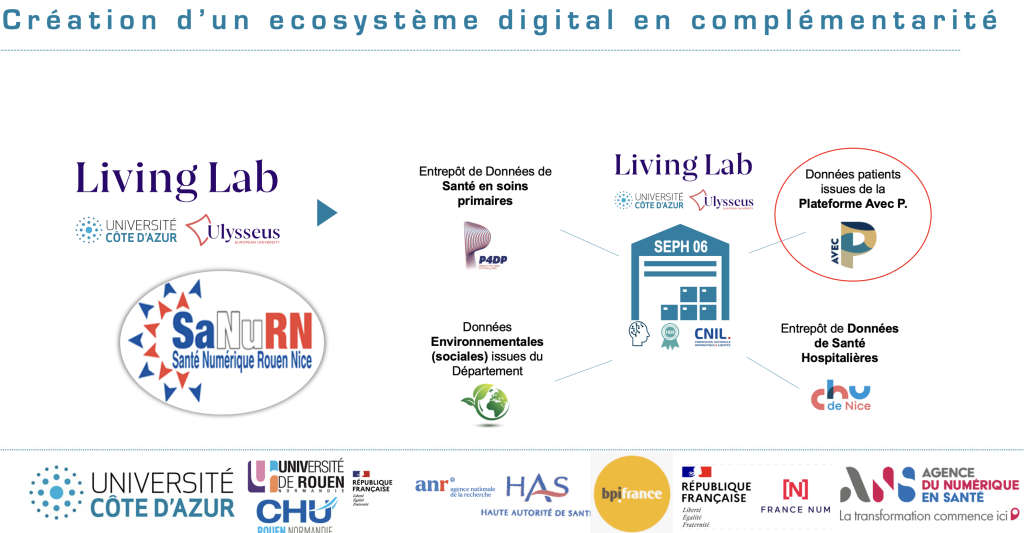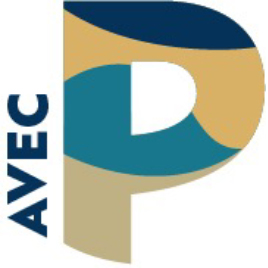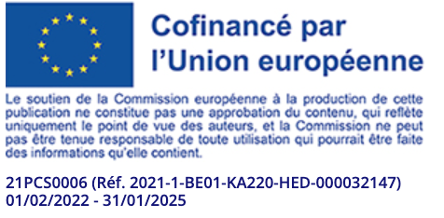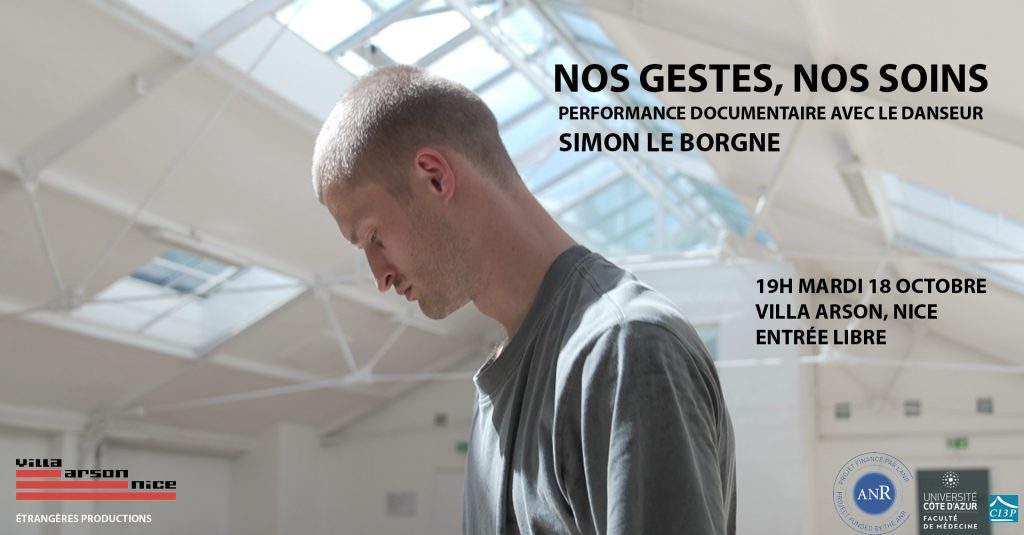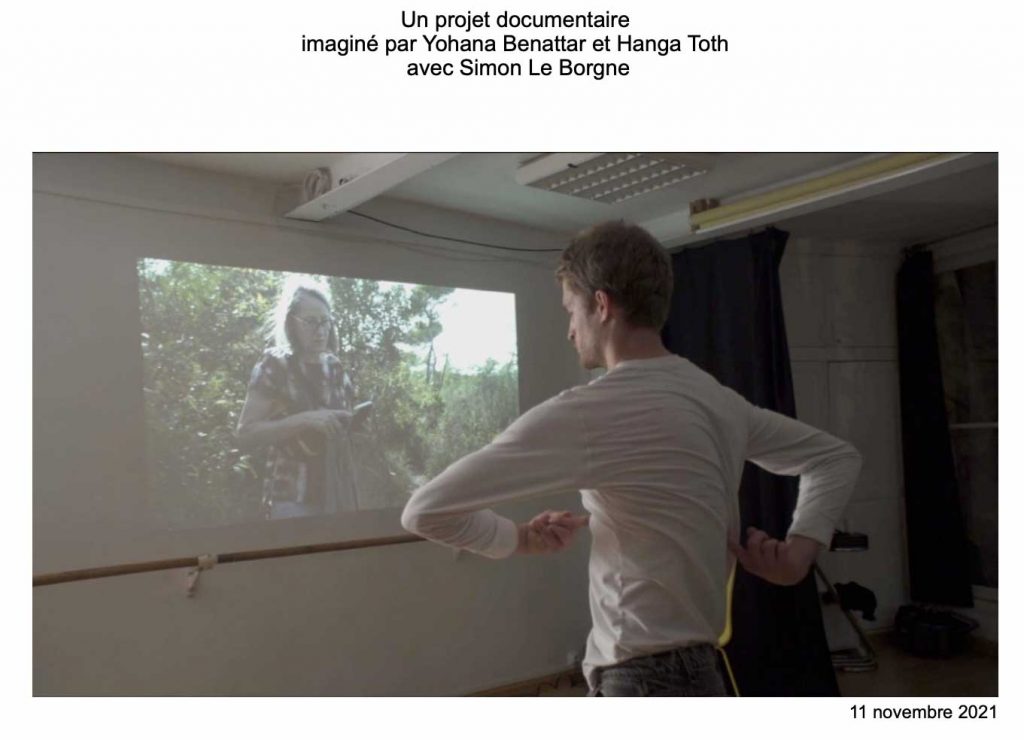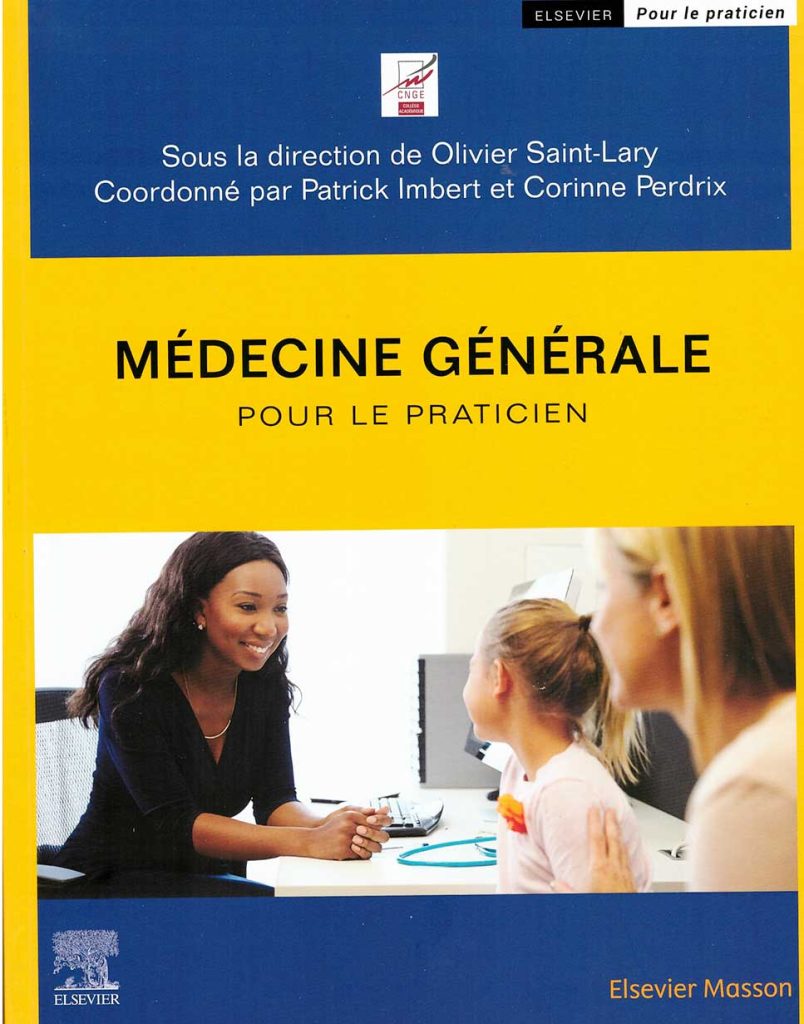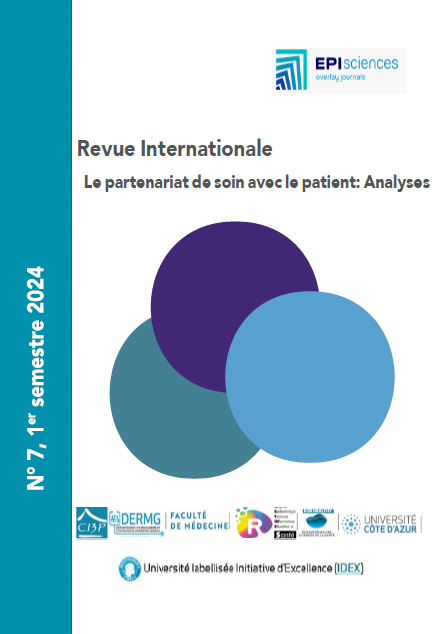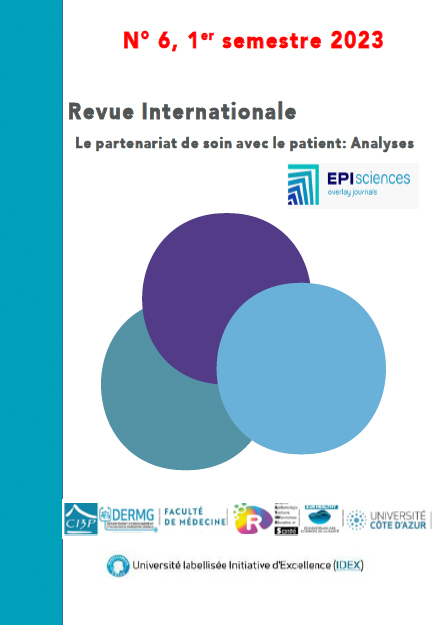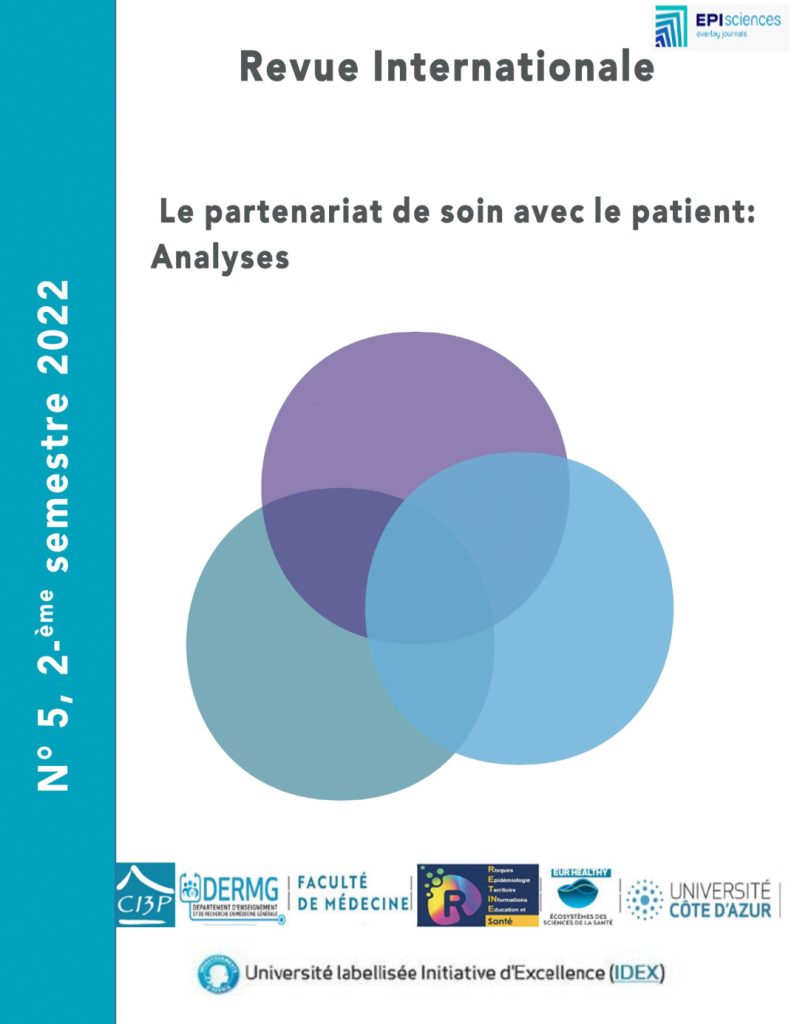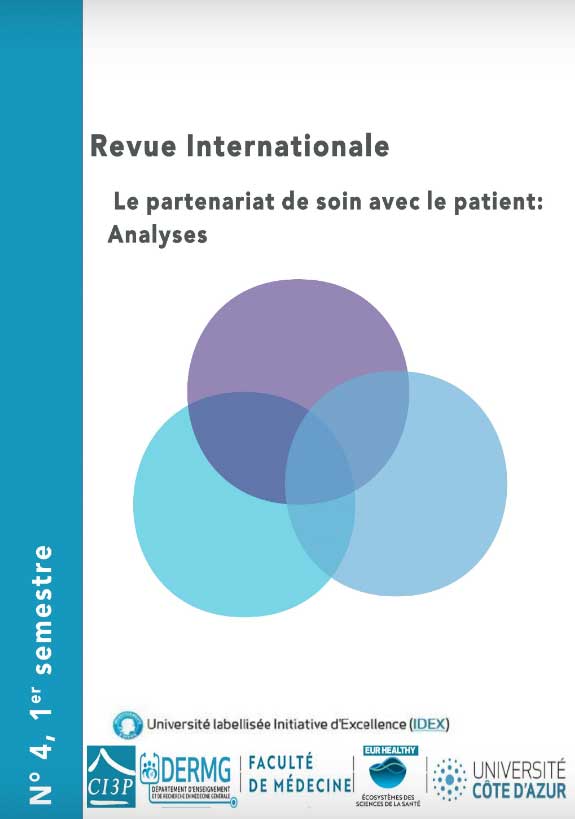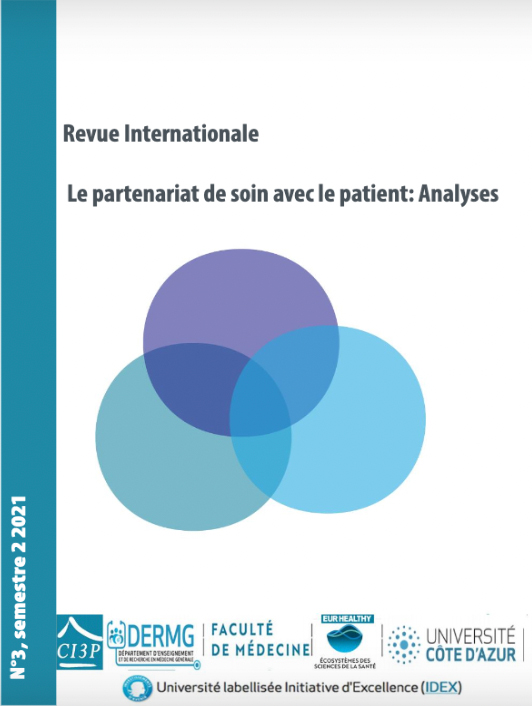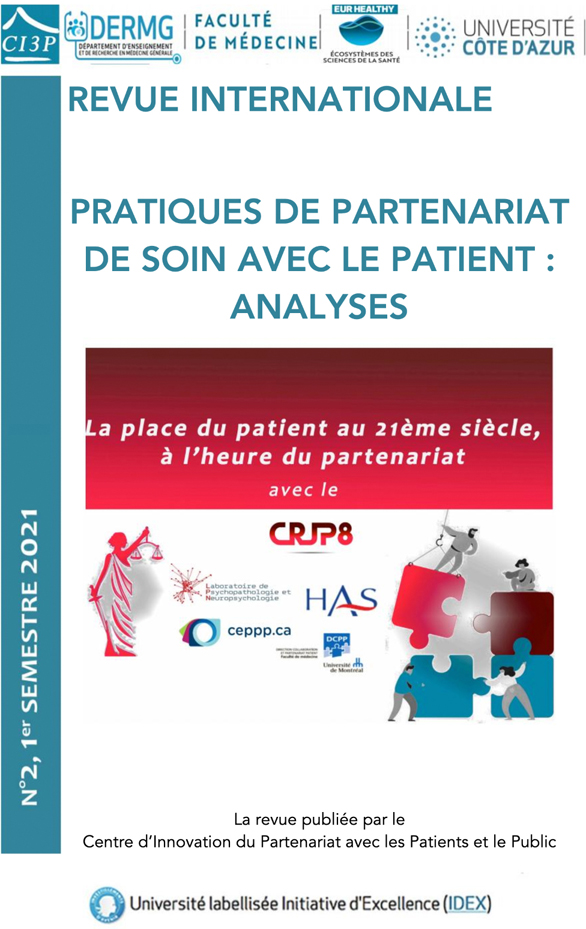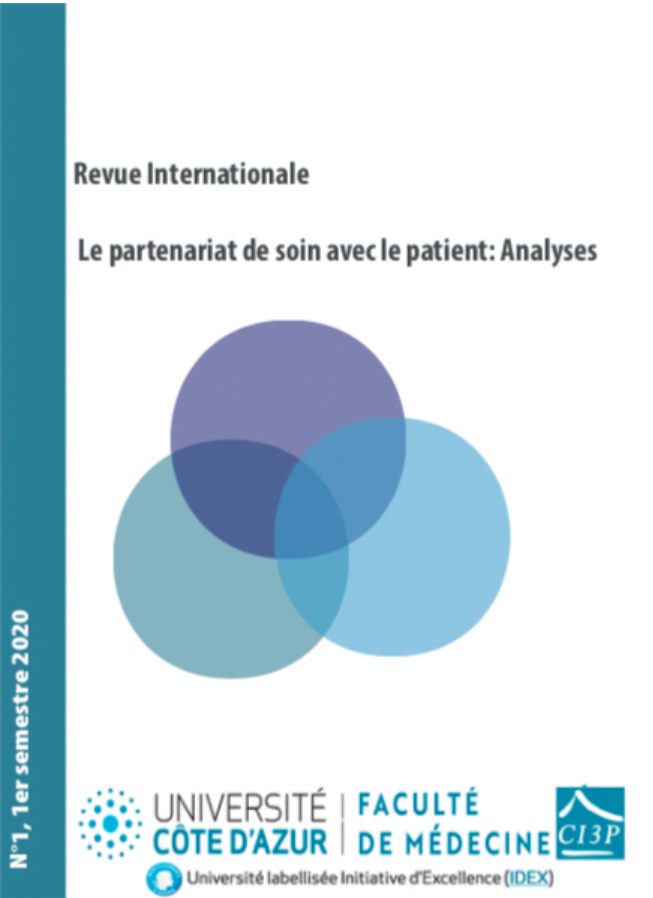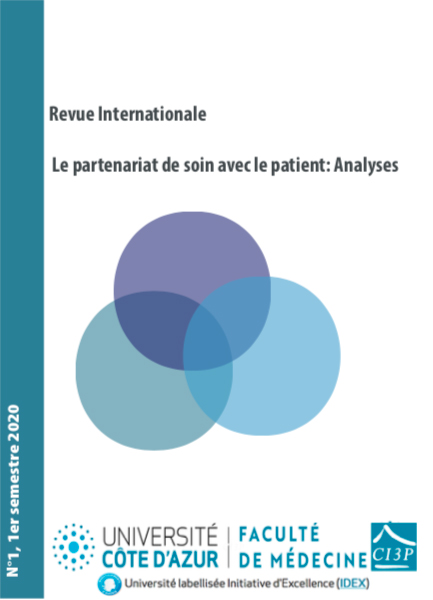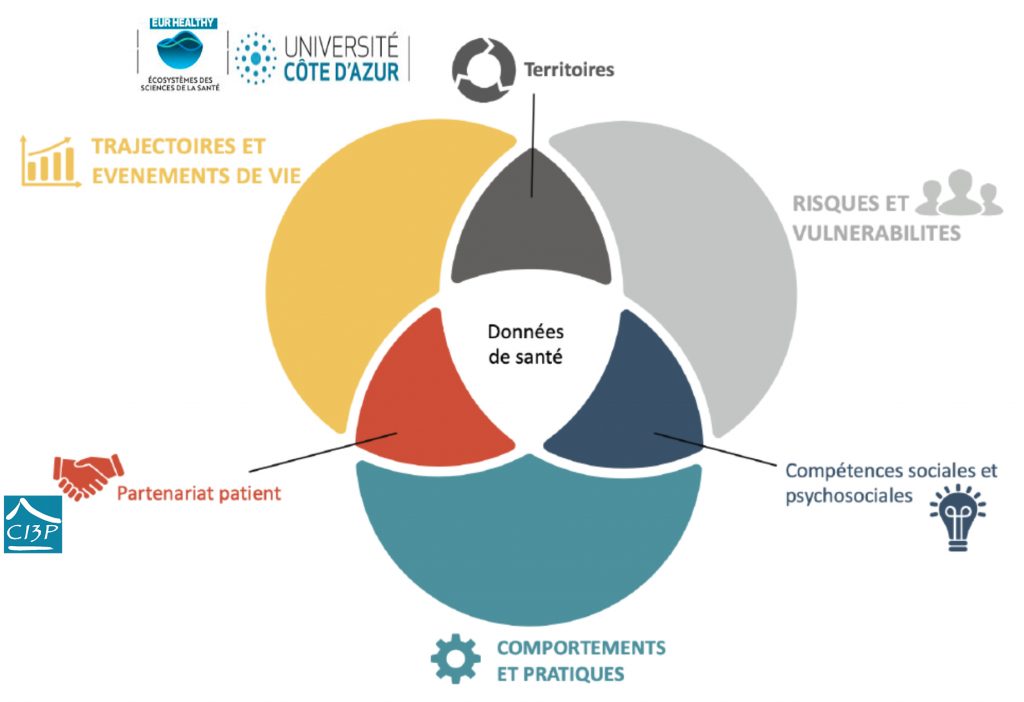Cette espace met à disposition une bibliographie par catégories :
- En premier lieu, vous trouverez les publications du CI3P sur le partenariat de soin avec le patient
- en second lieu apparait la bibliographie publiée sur le partenariat de soin en partenariat avec le patient selon le modèle de Montréal
- En troisième lieu vous est proposé une bibliographie conséquente sur l’implication des patients dont est issu le partenariat de soin avec le patient tels que développés par le Centre d’Innovation du partenariat avec les patients et le Public et le Centre d’Innovation du Partenariat avec les Patients et le Public.
Bibliographie produite par le CI3P et ses membres
Rubinstein S., Tisseur M. (2025). Quand patients et professionnels de santé enseignent ensemble. Une pédagogie de la résonance. Gestions hospitalières, N° 649, pp. 482-486.
Flora L. (2025). Méthodologie réflexive d’analyse de ces activités de partenariat: la clinique de l’activité. Coopérations Réflexives en Santé – (CoReS)? Hypothèses, Novembre.
Marion, Bricka B. (2025). « Contribuer à ma mesure à transformer le système de santé », in S’engager dans le partenariat patient-soignant : récits d’expériences du soin partagé. Clamecy: Ellipses, pp. 141-172.
Flora L., Fernandez N. (2025). Éléments de compréhension de nouvelles formes de soin : rapport d’expérience des tandems de partenariat médecin-patient partenaire en clinique. Le partenariat de soin avec le patient: analyses. N°8, 1er semestre, pp. 52-87.
Claessens A., Verkest E., Erbstein J.-J. (2025). Partenariat patient et nouvelles technologies : vers une amélioration des pratiques médicales ? Le partenariat de soin avec le patient: analyses. N°8, 1er semestre, pp. 24-51.
Lunel A., Flora L. (dir.), (2025), Médiateurs de santé publique, médiateurs de santé pairs, pairs aidants, patients partenaires. Les actes du colloque, Les Editions Hospitalières (LEH éditions).
Rubinstein S. Flora L. (2025), La délicate question de la rétribution du savoir expérientiel. Les actes du colloque, Les Editions Hospitalières (LEH éditions), pp. 11-26.
Flora L. (2025), Médiateurs de santé pairs, pairs aidants, patients partenaires, des tandems de partenariat médecins-patients en milieux cliniques. Les actes du colloque, Les Editions Hospitalières (LEH éditions), pp. 83-98.
Flora L. (2025), Un consortium interuniversitaire réuni pour la reconnaissance par validation des acquis d’expérience (VAE) des savoirs issus de la vie avec la maladie/situation de handicap. Les actes du colloque, Les Editions Hospitalières (LEH éditions), pp. 99-110.
Verkest E. Borsellino J., Creupelandt C. (2025). Du savoir expérientiel au partenariat : l’alliance des savoirs. L’information psychiatrique. Vol 6/101, pp. 393-399.
Goosse M., Willems S., Popescu C., Peeters L., Dans C., Munk S., Lovulo S., Flora L., Batala L., (2025). Immersion 360° Immersion-Simucare: guide méthodologique. Cofinancé par le programme Erasmus+ de l’Union européenne [21PCS0006 / 2021-1-BE01-KA220-HED-000032147 Période 01/02/22 au 31/01/25]
Goosse M., Willems S., Popescu C., Peeters L., Dans C., Munk S., Lovulo S., Batala L., Flora L., (2025). Référentiel de compétence communicationnelle pédiatrique. SIMUCARE-immersion. Résultat de recherche financé par l’Union Européenne, programme ERASMUS, (21PCS0006 / 2021-1-BE01-KA220-HED-000032147, Période 01/02/22 au 31/01/25).
Flora L. (2024). Le modèle de Montréal ou l’approche « patient-partenaire ». Revue de neuropsychologie. Vol. 16, N° 4, pp. 233-239.
Burel L. (2024). Le tandem partenariat médecin généraliste-patient partenaire : une expérience transformative. Thèse d’exercice de médecine, Faculté de médecine de Nice, Université Côte d’Azur.
Flora L. (2024). « 20 ans de démocratie sanitaire : état des lieux et impact de la pandémie ». Revue de la société française d’histoire des hôpitaux, pp. 41-46
Rubinstein S. (2024). « La place de l’usager en psychiatrie : l’exemple de l’hôpital Sainte-Marie de Nice (1860-1986) ». Revue de la société française d’histoire des hôpitaux, pp. 54-64.
Flora L., Grenier C., Ponsignon F.(dir.). (2024). « Experience in Health Innovation: Ephemeral Fashions or New Paradigm? – Crossed perspectives in the health ecosystem« , London :Editions Wiley.
Ravot M.,Flora L . (2024) A Brief History of Changes {in) the Medico-Social Sector over Recent Decades. Interview with Marielle Ravot in . « {Experience in Health Innovation: Ephemeral Fashions or New Paradigm? – Crossed perspectives in the health ecosystem} », London :Editions Wiley, pp 163-182.
Flora L, Darmon D., Darmoni S., Grosjean J., Simon C., Hassanaly P., Dufour J.-C. (2024). Help with Prescribing Mobile Health Applications A Partnership Design in the Medico-Social Sector over Recent Decades. Interview with Marielle Ravot in . « {Experience in Health Innovation: Ephemeral Fashions or New Paradigm? – Crossed perspectives in the health ecosystem} », London :Editions Wiley, pp 227-237.
Flora L. (2023). « La question du patient et de ses données numériques dans un environnement de la santé en cours de digitalisation« . Le journal de la médecine légale, 2023/3, N° 3, pp 16-21.
Flora L., Darmon D., Darmoni S., Grosjean J., Simon C., Hassanaly P., Dufour J.-C. (2023). « L’aide à la prescription d’application mobiles de santé : Une innovation dans et par la relation médecin patient », dans L’expérience dans l’Innovation en santé : modes éphémères ou nouveau paradigme ? – Regards croisés dans l’écosystème de la santé ». Londres : Iste.
Flora L., Casta C., Munck S., Fauré S., Gasperini F., Rubinstein S., Darmon D., Ravot M., Bouchez T. (2023). Attribuer un prix de thèse de médecine générale en partenariat avec les patients partenaires : une expérience démarche partenariale. Le partenariat de soin avec le patient: analyses : Université Côte d’azur, N°. 6 pp. 67-97.
Flora L. (2023). « Savoirs expérientiels en santé et expertises patients ». dans Troubles dans le monde du bénévolat, (Dir. Ferrand-Bechmann D.), Paris : Chroniques sociales, pp.60-67.
Lunel A., Flora L. (2023) » Avant propos. » Le Journal de droit de la santé et de l’assurance maladie, N° 36, p. 9.
Flora L. (2023). » La place des patients au 21ème siècle : l’exemple de l’implication des patients partenaires avec le CI3P dans l’environnement numérique. » Le Journal de droit de la santé et de l’assurance maladie, N°36, pp. 10-18..
Rubinstein S. (2023). » L’e-santé mentale : miroir aux alouettes ou futur des soins psychiatriques ? » Le Journal de droit de la santé et de l’assurance maladie, N°36, pp. 25-33. ( Ecouter l’émission sur la santé mentale et le numérique au sein duquel cet article et mentionner pour sa pertinence en cliquant ici)
Flora L., Darmon D., Darmoni S., Grosjean J., Simon C., Hassanaly P., Dufour J.-C. (2022). « Innover par l’aide à la décision dans la relation médecin-patient d’application mobiles : la recherche ApiAppS ». Le partenariat de soin avec le patient : analyses, Université Côte d’azur, N° 4, pp. 73-94.
Flora L., Koenig M.(2021). « La question du rétablissement et du patient partenaire », in Manuel de la psychiatrie » 4ème édition. (coord. Luc Mallet, Julien Guelfi, Frédéric Rouillon), Paris : Edition Elsevier Masson, pp. 779-782.
Bonardi C., Karcher B., Collazzo G., Barbaroux A., Balez E., Faure S., Halloy A., Flora L. (2021). « Partenariat avec les patients : les leçons d’une pandémie », Neuropsychologie, 13 (2), pp. 116-120.
Pomey M.-P., Clavel N., Normandin L. Del Grande C. Ghadiri D. P., Fernandez-McAuley I., Boivin A., Flora L., Janvier A., Karazivan P., Pelletier J.-F., Fernandez N., Paquette J. Dumez V. (2021) « Assessing and promoting partnership between patients and healthcare professionals : co-construction of the CADICEE tool for patients and their relatives » Health Expectations. Vol. 24, Issue 4, pp.1230-1241
Barchewitz M., Charels M., Flora L., Gueroult-Accolas, L., Honoré S., Allenet .B, Hache G.(2021). »Connaissances et représentations sur le partenariat patient : enquête auprès des pharmaciens. » Le Pharmacien Hospitalier et Clinicien. Volume 56, Issue 4, pp. 345-354
Pétré B., Louis G., Voz B., Berkesse A., Flora L. (2020). »Patient partenaire : de la pratique à la recherche. » Santé publique, Vol. 32, N° 4, Juillet-août, pp. 371-374
Faure S., Halloy A., Karcher B., Flora L., Colazzo G., Barbaroux A., Balez E., Bonardi C. (2020). « Polyphonies sur les enjeux du partenariat patient au temps du COVID-19, Revue de Neuropsychologie, Neurosciences Cognitives et Cliniques, V. 12, N° 2, Avril-mai-juin 2020, pp. 232-237.
Carayol-Ravot M. (2020). Covid-19 : crise sanitaire, confinement et maladies chroniques. Impact du confinement sur l’expérience patient et le partenariat entre patients et professionnels de santé. Mémoire de Master de santé publique. Université Aix Marseille.
Flora L., Darmon D. Benattar J.-M. (Coord.).(2019), Contribution à l’état de l’art : Retour sur le 1er colloque International en France sur le partenariat de soin avec le patient à partir des communications et écoévaluations. Centre d’Innovation du Partenariat avec les Patients et le Public (CI3P), Université côte d’azur.
Bibliographie sur le partenariat de soin avec les patients dans la recherche
Andersen, J., Talaric, R., Marinello, D., Aguilera, S., Galetti, I., Bandeira, M., Ballarin Castan, J., Blagojevic, J., Bouillot, C., Bucsa, C., Cannizzo, S., Cavagna, L., Ciupera, M., Collado, E., Cornet, A., Damian, L., Diederichsen, L., Drapalova, O., Elefante, E., … Mosca, M. (2026). Patient partnership model in rare and complex rheumatological conditions : Research and beyond in European Reference Network ReCONNET. The Lancet. Rheumatology, S2665-9913(25)00284-X. https://doi.org/10.1016/S2665-9913(25)00284-X
Busnel, Y., Pomey, M.-P., Termoz, A., Christophe, V., Tournigand, C., Jouet, E., Panse, L., Cognon, S., Ganter, C., Villate, A., Maisani, P., Preau, M., & Haesebaert, J. (2026). Implementation and evaluation of a peer-to-peer support program in oncology : Study protocol for the PaRole Onco France model. Archives of Public Health = Archives Belges de Sante Publique, 84(1), 24. https://doi.org/10.1186/s13690-025-01827-6
Fernandez N., Sturmberg J.-P. (2025). Fostering Physician-Patient Partnerships: The Importance of Embracing the Ontological and Epistemological Understandings of Knowledge. Health Expectations, Dec. Volume 28, Issue 6: 28:e70484: https://doi.org/10.1111/hex.70484
David G., Ruchon C., Purenne C. (2025). Cadre de management opérationnel: structuration de l’accompagnement au partenariat avec les patients et les proches, in Démocratie en santé et pouvoir d’agir des usagers. Bordeaux: les Editions Hospitalières (LEH). pp. 263-276.
Garidi S., Vitall S., Feider S. (2025). La construction du modèle luxembourgeois du partenariat patient: une feuille de route pour une transformation systémique, in Démocratie en santé et pouvoir d’agir des usagers. Bordeaux: les Editions Hospitalières (LEH). pp. 289-306.
Caballero, C., Adam, V., Birta, O., Meheus, L., Needham, J., Hodgdon, C., Gilhams, L., Biurrun, C., MacKenzie, M., Spanic, T., Stobart, H., Belhadi, L., Maués, J., Casas, A., Schumacher-Wulf, E., Straehle, C., O’Reilly, S., Cameron, D., Piccart, M., … Chua, B. (2025). Le partenariat patient du Brest International Group (BIG) : Intégrer une participation significative des patientes à la conception et à la réalisation de la recherche clinique sur le cancer du sein. Breast (Édimbourg, Écosse) , 85 , 104642.
Huang, N.-S., Saldanha, IJ et Ervin, A.-M. (2025). Partenaires de recherche patients dans l’élaboration d’ensembles de critères d’évaluation principaux : une revue systématique. Journal of Clinical Epidemiology , 187 , 111926.
Wiedermann, C.J., Barbieri, V., Mahlknecht, A., Felderer, C., Piccoliori, G., Hager von Strobele-Prainsack, D., et Engl, A. (2025). Patients et communautés façonnent les priorités de recherche en santé régionale : une étude participative menée au Tyrol du Sud, en Italie. Healthcare (Bâle, Suisse) , 13 (21).
Las Vergnas O. (2025). « Thématiques abordées dans la revue « Le Partenariat de Soin avec le Patient – Analyses » (PSPA) :Une analyse lexicale des 30 premiers articles parus (2020-2024)« . Le partenariat de soin avec le patient: analyses. N°8, 1er semestre, pp. 6-24.
Bricka B. (2025). S’engager dans le partenariat patient-soignant : récits d’expériences du soin partagé. Clamecy: Ellipses
Claessens A. Verkest E., Erbstein J.-J. (2025). « Partenariat patient et nouvelles technologies : vers une amélioration des pratiques médicales ?« . Le partenariat de soin avec le patient: analyses. N°8, 1er semestre, pp. 24-51.
Stones, S. R., Lobban, D., Skobe, C., Gokool, N., Bharadia, T., Geraci, A., & Matheis, R. J. (2025). Patients as partners in medical publications : The ISMPP journey of engagement. Current Medical Research and Opinion, 1‑8. https://doi.org/10.1080/03007995.2025.2556317
Pomey, M. P., Wilhelmy, C., Fournier-Tombs, M., Dumez, V., Vialaron, C., Iliescu, M. N., ,Courtemanche S.Prevost K., Normandin L. & David, G. (2025). Partnership, Collaboration, and Co-Production to Improve Patient Experience Beyond Conducting Surveys–Lessons from the Quebec Model, Canada. Patient Experience Journal, 12(2), 112-123.
Dahlberg, J., Österberg, M., Hellberg, C., Stenman, J., Fundell, S., Andersson, Å. G., Edling, S., & Liss, A. (2025). Lipoedema research priorities : A Swedish priority-setting partnership for future treatment and diagnostic studies. BMJ Open, 15(8), e086869. https://doi.org/10.1136/bmjopen-2024-086869
Maini, P., Tersigni, C., Micsinszki, S., Murray, K., Allemang, B., Frost, K., & Crowley, E. (2025). Advancing patient-led research and establishing a national IBD patient partner network in Canada : A call to action. Journal of the Canadian Association of Gastroenterology, 8(4), 117‑119. https://doi.org/10.1093/jcag/gwaf014
Murphy, R., & Mychasiuk, R. (2025). Crossing a chasm : Patient partnership and preclinical pain research. The Journal of Pain, 105529. https://doi.org/10.1016/j.jpain.2025.105529
Reeck, N., Völkel, A., Mammes, M., Urbahn-Schiefer, D., Reineking, B., Stuckenschneider, T., & Brütt, A. L. (2025). Research in Partnership With Older People-Involvement in Conducting and Analysing Focus Groups. Health Expectations : An International Journal of Public Participation in Health Care and Health Policy, 28(4), e70354. https://doi.org/10.1111/hex.70354
Pomey M.-P., Wihemy C., Fournier-Tombs M., Dumez V., Vialaron C., Nelea Iliescu M., Prevost K., Courtemanche S., Normandin L., David G. (2025). Partnership, Collaboration, and Co-Production to Improve Patient Experience Beyond Conducting Surveys – Lessons from the Quebec Model, Canada. Patient Experience Journal, 12(2):112–123
Tobiano, G., Gillespie, B. M., Carlini, J., Muir, R., Rasiah, J., Wan, C. S., McCarron, T. L., Moffat, K., Jahandideh, S., Chaboyer, W. (2024). Establishing patient partners’ roles on research teams : A scoping review. Research Involvement and Engagement, 10(1), 129. https://doi.org/10.1186/s40900-024-00664-1
Burel L. (2024). Le tandem de partenariat médecin généraliste-patient partenaire : une expérience transformatrice. Thèse d’exercice de médecine. Université côte d’azur.
Loughhead, M., Hodges, E., McIntyre, H., Procter, N., Barbara, A., Bickley, B., Martinez, L., Albrecht, L., Huber, L. (2024). Pathways for Strengthening Lived Experience Leadership for Transformative Systems Change : Reflections on Research and Collective Change Strategies. Health Expectations : An International Journal of Public Participation in Health Care and Health Policy, 27(5), e70048. https://doi.org/10.1111/hex.70048
McPherson, A., Paudyal, V., Lowrie, R., Heath, H., Moir, J., Allen, N., Barnes, N., Hill, H., Araf, A., Lombard, C., Ross, S., Tearne, S., Jagpal, P., Cheed, V., Akhtar, S., Provan, G., Williamson, A., Mair, F. S. (2024). Patient and Public Involvement in Research Evaluating Integrated Care for People Experiencing Homelessness : Findings From the PHOENIx Community Pharmacy Pilot Randomised-Controlled Trial. Health Expectations : An International Journal of Public Participation in Health Care and Health Policy, 27(5), e70070. https://doi.org/10.1111/hex.70070
Richards DP, Poirier S, Mohabir V, Proulx L, Robins S, Smith J. Reflections on patient engagement by patient partners: how it can go wrong. Res Involv Engagem. 2023 Jun 12;9(1):41. doi: 10.1186/s40900-023-00454-1. PMID: 37308922; PMCID: PMC10262483.
Dumez, V., L’Espérance, A. (2024). Beyond experiential knowledge: a classification of patient knowledge. Soc Theory Health (2024). https://doi.org/10.1057/s41285-024-00208-3
Côté, C.I. (2024). A critical and systematic literature review of epistemic justice applied to healthcare: recommendations for a patient partnership approach. Med Health Care and Philos. https://doi.org/10.1007/s11019-024-10210-1
Psiuk T. (2024 ).Le concept du patient partenaire, de l’implicite vers l’explicite. journal de médecine légale. Fév 14;3(3):3-6.
Montiel C, Jackson M, Clovin T, Bogdanova E, Côté C, Descoteaux A, Wong C, Dumez V, Pomey MP, Hanna D. (2024). Patient Learning Pathway: Identifying Patient Competencies in Teledermatology for Effective Management of Dermatological Conditions. J Cutan Med Surg. 2024 Mar 19:12034754241238716.
Dhamanaskar R, Tripp L, Vanstone M, Canfield C, Levasseur MA, Abelson J. (2024). Patient partner perspectives on compensation: Insights from the Canadian Patient Partner Survey. Health Expect. Jan 15;27(1):e13971.doi: 10.1111/hex.13971.
Scholz B., Kirk L., Warner T., O’Brien L. , Kecskes Z., Mitchell I. (2024) From a Single Voice to Diversity: Reframing ‘Representation’ in Patient Engagement. Qualitative Health Research, doi/pdf/10.1177/10497323231221674
Pomey, M., Pelaez, S., Le Roux, E., Demers‐Payette, O., Sirois, M., Lochhead, L., Ganache, I., Normandin, L., L’Espérance, A., De Guise, M. (2024). How to mobilise users’ experiential knowledge in the evaluation of advanced technologies and practices in Quebec? The example of the permanent users’ and relatives’ panel. Health Expectations, 27(1), e13964. https://doi.org/10.1111/hex.13964
Blackburn, S., Clinch, M., de Wit, M., Moser, A., Primdahl, J., van Vliet, E., Walker, C., Stevenson, F. (2023). Series : Public engagement with research. Part 1 : The fundamentals of public engagement with research. The European Journal of General Practice, 29(1), 2232111. https://doi.org/10.1080/13814788.2023.2232111
Swaithes, L., Campbell, L., Anthierens, S., Skrybant, M., Schiphof, D., French, H., de Wit, M., Blackburn, S., Dziedzic, K. (2023). Series : Public engagement with research. Part 4 : Maximising the benefits of involving the public in research implementation. The European Journal of General Practice, 29(1), 2243037. https://doi.org/10.1080/13814788.2023.2243037
Sergent L. (2023). Patient pantin ou partenaire : une étude de la participation à l’hôpital pendant la crise Covid. Connexions, n° 118, pp.81-93
Zaratin, P., Khan, U., Graffigna, G. (2023). Comment on « Reflections on patient engagement by patient partners : How it can go wrong ». Research Involvement and Engagement, 9(1), 122. https://doi.org/10.1186/s40900-023-00534-2
Christiansen, M. G., Pappot, H., Hamilton, C., Lund-Jacobsen, T., Kristensen, A. W., Nordentoft, S., Høeg, B. L., Bidstrup, P., Nielsen, I. H., Ulstrup, J., Trip, A. K., Jarden, M., Piil, K. (2023). Patient Engagement in Research Scale (PEIRS-22) : Danish translation, applicability, and user experiences. Research Involvement and Engagement, 9(1), 115. https://doi.org/10.1186/s40900-023-00526-2
Harman, N. L., McGiveron, K., Tudur Smith, C., Williamson, P. R., Barrington, H. (2023). Opening up ideas : An advent calendar for patient and public engagement in clinical trials research. Research Involvement and Engagement, 9(1), 118. https://doi.org/10.1186/s40900-023-00530-6
Nohová, I., Andrews, J., Votan, B., Miller, A., Sehouli, J., Berger, R. (2023). Patient involvement in research within the Gynecological Cancer InterGroup : A call to action for a systematic approach : Results from a survey. Health Science Reports, 6(12), e1735. https://doi.org/10.1002/hsr2.1735
Røssvoll, T. B., Rosenvinge, J. H., Liabo, K., Hanssen, T. A., Pettersen, G. (2023). Patient and public involvement in health research from researchers’ perspective. Health Expectations : An International Journal of Public Participation in Health Care and Health Policy, 26(6), 2525‑2531. https://doi.org/10.1111/hex.13853
Vanderhout, S., Richards, D. P., Butcher, N., Courtney, K., Nicholls, S. G., Fergusson, D. A., Potter, B. K., Bhalla, M., Nevins, P., Fox, G., Ly, V., Taljaard, M., Macarthur, C. (2023). Prevalence of patient partner authorship and acknowledgment in child health research publications : An umbrella review. Journal of Clinical Epidemiology, 164, 35‑44. https://doi.org/10.1016/j.jclinepi.2023.10.012
Chudyk A. M., Stoddard R., McCleary N., Duhamel T. A., Shimmin C., Hickes S., Schultz A. pancanadian conselors group patients and public (2023). Exploring patient and caregiver perceptions of the meaning of the patient partner role: a qualitative study Research Involvement Engagement 9 , 106 (2023). https://doi.org/10.1186/s40900-023-00511-9
Fox, G., Lalu, M. M., Sabloff, T., Nicholls, S. G., Smith, M., Stacey, D., Almoli, F., Fergusson, D. A. (2023). Recognizing patient partner contributions to health research : A systematic review of reported practices. Research Involvement and Engagement, 9(1), 80.
https://doi.org/10.1186/s40900-023-00488-5
Pogorzelski D., Wells J. L.J., Marvel D.; Palmer J., Mullins C. D., Medeiros M., Gallant J. L., Spicer E., Bergin P., Gitajn, I. L., Mullin D. S., Gaski G., Hymes R., Bzovsky S., Slobogean G. P., Sprague S. and the PREP-IT Investigators. (2023). Pragmatic design and inclusion of patient–partner representatives improves participant experience in clinical research.
Pogorzelski D., Wells J. L.J., Marvel D.; Palmer J., Mullins C. D., Medeiros M., Gallant J. L., Spicer E., Bergin P., Gitajn, I. L., Mullin D. S., Gaski G., Hymes R., Bzovsky S., Slobogean G. P., Sprague S. and the PREP-IT Investigators. (2023). Pragmatic design and inclusion of patient–partner representatives improves participant experience in clinical research.
Jackson M., Clovin T., Montiel C., Bogdanova E., Côté C., Descoteaux A., Wong C., Dumez V., Pomey M.-P (2023). Adopting a learning pathway approach to patient partnership in telehealth: A proof of concept. journal Preproof: https://doi.org/10.1016/j.pecinn.2023.100223
Nielssen, I., Ahmed, S., Zelinsky, S., Dompe, B., Fairie, P., Santana, M. J. (2023). Co-building a training programme to facilitate patient, family and community partnership on research grants : A patient-oriented research project. Health Expectations : An International Journal of Public Participation in Health Care and Health Policy. https://doi.org/10.1111/hex.13763
Riches, L., Ridgway, L., Edwards, L. (2023). Co-learning commentary : A patient partner perspective in mental health care research. Research Involvement and Engagement, 9(1), 24. https://doi.org/10.1186/s40900-023-00435-4
Yous, M.-L., Ganann, R., Ploeg, J., Markle-Reid, M., Northwood, M., Fisher, K., Valaitis, R., Chambers, T., Montelpare, W., Légaré, F., Beleno, R., Gaudet, G., Giacometti, L., Levely, D., Lindsay, C., Morrison, A., Tang, F. (2023). Older adults’ experiences and perceived impacts of the Aging, Community and Health Research Unit-Community Partnership Program (ACHRU-CPP) for diabetes self-management in Canada : A qualitative descriptive study. BMJ Open, 13(4), e068694. https://doi.org/10.1136/bmjopen-2022-068694
Rubin, M. R. (2023). The Role of the Patient Partnership in Designing Research on Neuropsychiatric Issues in Hypoparathyroidism. Journal of the Endocrine Society, 7(7), bvad068. https://doi.org/10.1210/jendso/bvad068
Boivin A., Flora L., Dumez V., L’Espérance A., Berkesse A., Gauvin F.-P. (2017). « Transformer la santé en partenariat avec les patients et le public : historique, approche et impacts du “modèle de Montréal”», In « La participation des patients » « vol. 2017, Paris : Editions Dalloz, pp. 11-24.
Ghadiri D. P. S., Flora L., Pomey M.-P. (2017). « Le virage patient partenaire de soins au Québec. Reconfiguration de l’exercice du pouvoir médical et lutte pour de nouvelles subjectivités« . In « La participation des patients« , Paris : Editions Dalloz, pp. 25-36.
Boivin, A., F.-P. Gauvin, P. Lehoux, I. Marcoux, Néron A, G. Baril and M. Flon (2017). Que doit-on savoir sur l’aide médicale à mourir? Comprendre les besoins d’information et les enjeux du partenariat avec les patients, les proches aidants et les professionnels de la santé, Centre d’excellence sur le partenariat avec les patients et le public: 46.
Boivin, A., V. Dumez, C. Loignon, M.-P. Gagnon, P. L. Bush, I. Ganache, F. Laverdière, M. Fournier, M. Menear, J. Légaré and J. Caron-Malenfant (2015). Soutenir la recherche en partenariat avec les patients et le public: stratégie d’engagement pour l’Unité de SOUTIEN-SRAP Quebec: 22.
Flora L. (2014). « Des patients réflexifs, au potentiel de transformation des systèmes de santé. » dans l’ouvrage Les métiers de la santé face aux industries pharmaceutique, agroalimentaires et chimiques, (Dir. Scheffer P.), Paris : L’harmattan.
Bibliographie sur l’implication des patients dans et sur la recherche
Coyne, P., Copeland, L., Murphy, D., Redding, A., Johnson, C. C., Kippen, K. E., & Santarossa, S. (2026). The Patient Engaged Research Center’s Sustainable Funding Framework : A Path Towards Sustainable Patient Engagement in Care and Research Within a Health System. Learning Health Systems, 10(1), e70047. https://doi.org/10.1002/lrh2.70047
Nissen, S., Karlsson, A. W., & Nørgaard, B. (2026). Evaluation Tools for Patient and Public Involvement (PPI) in Health Research : A Scoping Review. The Patient, 19(1), 21‑49. https://doi.org/10.1007/s40271-025-00765-3
Bertezène S., Yatim F. (2025). Quel cadre épistémologique pour la démocratie en santé ? in Démocratie en santé et pouvoir des usagers. Bordeaux: Les Editions Hospitalières (LEH), pp. 97-120
Moncorps F. (2025). Le processus d’élaboration des savoirs expérientiels: le cas des personnes vivant avec une maladie chronique, in Démocratie en santé et pouvoir des usagers. Bordeaux: Les Editions Hospitalières (LEH), pp. 121-134.
Gross O. (2025). La gouvernementalité des patients-engagés et leur régime d’action: une recherche qualitative, in Démocratie en santé et pouvoir d’agir des usagers. Bordeaux: Les Editions Hospitalières (LEH), pp. 163-184
Bradbury, N. V., Roberts, J., Lock, S., Haddon, L., Begum, S., Goulao, B., Mackintosh, N., Newby, C., O’Reilly, M., & Gray, L. J. (2025). Mapping the evidence for patient and public involvement and engagement in statistical methodology research : A scoping review protocol. PloS One, 20(12), e0330232. https://doi.org/10.1371/journal.pone.0330232
Escañuela Sánchez, T., San-Lázaro Campillo, I., McKernan, J., Corcoran, P., & Greene, R. A. (2025). Study Protocol for the PARTICIPATE Project : Co-Creating Resources for Public Engagement in Maternity Care Clinical Audit and Learning. Health Expectations : An International Journal of Public Participation in Health Care and Health Policy, 28(6), e70491. https://doi.org/10.1111/hex.70491
ppmeier, B., Engel, A., Endres, M. et Nave, AH (2025). Point de vue des patients et priorisation de la recherche en réadaptation après un AVC : résultats d’une enquête en ligne en Allemagne. BMC Health Services Research , 25 (1), 1564.
Jouet E., Las Vergnas O., Vinçon-Leite A. (2025). Des savoirs expérientiels des personnes concernées aux approches expérientielles, L’information psychiatrique, pp. 383-392.
Clavel, N., Chen, J., Paquette, J., Briand, A., Lavoie-Tremblay, M., Bernard, L., Biron, A., Brault, D., Zahir, A., & Gélinas, C. (2025). The NOSO-COVID study : A large-scale survey assessing stakeholder perspectives on patient and family engagement in infection prevention, informed by Q-methodology findings. BMC Health Services Research, 25(1), 1251. https://doi.org/10.1186/s12913-025-13350-z
Khan, N., Keck, L., Sykes, C., Rowden, C., Simister, J., Fenlon, S., Mccallum, E., Bell, M., Whiting, D., Shelton, C., Wells, G., Giles, R., Howard, J., & Peckham, S. (2025). Diversity, community engagement and co-design in research : A rapid review. BMJ Leader, 9(3), 325‑330. https://doi.org/10.1136/leader-2024-001046
Burki, T. (2025). Enabling and supporting public and patient involvement in arthritis research. The Lancet. Rheumatology, S2665-9913(25)00282-6. https://doi.org/10.1016/S2665-9913(25)00282-6
Thick, M., & Bryant, V. (2025). Expert Patients and Their Contribution to Head and Neck Cancer Service Delivery, Education, Governance and Research. Otolaryngologic Clinics of North America, S0030-6665(25)00111-2. https://doi.org/10.1016/j.otc.2025.08.007
Cunha, M. S., Santos, J. da S., Sá-Sousa, A., Neves, A. L., da Silva, A. A., Gomes, D., Santos, J. Q., Bernardo, F., de Sousa, J. C., Almeida-Fonseca, J., & Jácome, C. (2025). Interest in public involvement, engagement and participation in research among patients with asthma : A secondary analysis of the EPI-ASTHMA study. PloS One, 20(9), e0332220. https://doi.org/10.1371/journal.pone.0332220
Baniña, M. C., Prabhune, R., Charles, C., Colmegna, I., Hudson, M., Bernatsky, S., & Peláez, S. (2025). Understanding patient and physician perspectives regarding innovative research in rheumatoid arthritis. The Journal of Rheumatology, jrheum.2025-0510. https://doi.org/10.3899/jrheum.2025-0510
Code, J., Lannon, H., & Lutrin, A. (2025). Agency in action : Engaging patient participation in research. Patient Education and Counseling, 141, 109353. https://doi.org/10.1016/j.pec.2025.109353
Lu, W., Li, Y., Evans, C., Currow, D., Bayuo, J., Zheng, T., Lu, Z., Li, M., Wray, J., & Yorke, J. (2025). Evolution of Patient and Public Involvement and Engagement in Health-Related Research : A Concept Analysis. Journal of Advanced Nursing.
Bjerregaard, M., Poulsen, I., Carlsen, E., Esparza, A., Smith, J., Brødsgaard, A. (2025). Patient and public involvement in neonatal research—Experiences and insights from parents and researchers. Research Involvement and Engagement, 11(1), 1. https://doi.org/10.1186/s40900-024-00670-3
Boden-Albala, B. (2025). Roadmap for Health Equity : Understanding the Importance of Community-Engaged Research. Stroke, 56(1), 239‑250. https://doi.org/10.1161/STROKEAHA.124.046958
Genovesi, E., Grant, S., Kifle, T. H., Li, J., Shand, A. J., Hoekstra, R. A. (2025). Community involvement in PhD students’ autism research projects : Challenges and opportunities. Autism : The International Journal of Research and Practice, 29(1), 3‑7. https://doi.org/10.1177/13623613241300683
Johnson, B. (2025). How citizen scientists and community engagement boost the impact of health research. Nature Medicine.
https://doi.org/10.1038/d41591-025-00003-1
Julie, R., Yael, B., Anaïs, H., Anne, T., Julie, H., Marie, V. (2025). Patient and Public Involvement in Pharmacoepidemiological Research : An Environmental Scan of an Emerging Area. Pharmacoepidemiology and Drug Safety, 34(1), e70080. https://doi.org/10.1002/pds.70080
Kletz, F., Marcellin, O. (2019). L’innovation avec le patient : Un renouvellement par le design organisationnel. Innovations, N° 60(3), 93‑120. Cairn.info.
Brégain, G. (2025). Savoirs expérientiels personnels « hors du sens commun » liés à la maladie chronique. Aequitas, 31(1), 50‑67.
Gardien, E. (2025). Comprendre et définir le savoir expérientiel. Aequitas, 31(1), 7‑30.
Groud, P.-F. (2025). Tailler sur mesure. De l’exploration à l’analyse des processus d’élaboration des savoirs expérientiels rares des personnes amputées. Aequitas, 31(1), 68‑90. Érudit.
Kernan, L. M., Pearl, M. B., Harri, A., Lambourne, C. A., Schlegel, R., Evarts, C. M., Crummer, M. B., Persels, C., Mullen, N., Pellegrini, V. D. J. (2025). The impact of a patient advisory board on a clinical comparative effectiveness trial : A comparison of patient and researcher perspectives. Journal of Comparative Effectiveness Research, e240050. https://doi.org/10.57264/cer-2024-0050
Klein, B., Perfetto, E. M., Oehrlein, E. M., Weston, F., Lobban, T. C. A., Boutin, M. (2025). Measuring and Demonstrating the Value of Patient Engagement Across the Medicines Lifecycle : A Patient Engagement Impact Measurement Framework. The Patient, 18(1), 3‑18. https://doi.org/10.1007/s40271-024-00713-7
Richards, D. P. (2025). Dear sceptics of patient engagement in research. BMJ (Clinical Research Ed.), 388, r133. https://doi.org/10.1136/bmj.r133
Lynch, E., Earle-Bandaralage, L., Eley, S., Gancia, A., Larcombe, S., Muthuralingam, S., Townsin, L., Wardill, H., Corsini, N. (2025). Credit where it’s due : Recognising lived experience in research authorship. Patient Education and Counseling, 130, 108472. https://doi.org/10.1016/j.pec.2024.108472
Sangong, S., Saah, F. I., Bain, L. E. (2025). Effective community engagement in one health research in Sub-Saharan Africa : A systematic review. One Health Outlook, 7(1), 4. https://doi.org/10.1186/s42522-024-00126-4
Spellecy, R., Nencka, A. (2025). Addressing Risk in Data Centric Research via Community Engagement. The American Journal of Bioethics : AJOB, 25(2), 85‑87. https://doi.org/10.1080/15265161.2024.2441698
Suliman, S., Agyei, L., Afzal, S. A., Williams, S. (2025). Leveraging community engagement to shape biomedical research priorities. Trends in Immunology, S1471-4906(24)00306-5. https://doi.org/10.1016/j.it.2024.12.004
Younan, E., McIntyre, S., Garrity, N., Karim, T., Wallace, M., Gross, P., Goldsmith, S. (2025). Involving people with lived experience when setting cerebral palsy research priorities : A scoping review. Developmental Medicine and Child Neurology. https://doi.org/10.1111/dmcn.16219
DelDot M., Lau E., Rayner N., Spinks J., Kelly F., Nissen L. (2024). Consumer Involvement in the Design and Development of Medication Safety Interventions or Services in Primary Care : A Scoping Review. Health Expectations : An International Journal of Public Participation in Health Care and Health Policy, 27(6), e70092. https://doi.org/10.1111/hex.70092
Drinkwater J., Farr M., Hickey G., Van Vliet E., Söderholm Werkö S., Klingmann I., Blackburn S. (2024). Series : Public engagement with research. Part 3 : Sharing power and building trust through partnering with communities in primary care research. The European Journal of General Practice, 30(1), 2328707. https://doi.org/10.1080/13814788.2024.2328707
Fitzpatrick, S. J., Lamb, H., Oldman, E., Giugni, M., Chakouch, C., Morse, A. R., Gulliver, A., Stewart, E., Oni, H. T., Miller, B., Edwards, B., Stewart, K., Bliokas, V., Ellis, L. A., Shand, F., Calear, A. L., & Banfield, M. (2024). Co-Creation in Research : Further Reflections From the « Co-Creating Safe Spaces » Project. Health Expectations : An International Journal of Public Participation in Health Care and Health Policy, 27(6), e70103. https://doi.org/10.1111/hex.70103
Atfeh J, Guerre P, Berkesse A, Thual G, Pozzi M, Huot L. (2°24). Involving Patients in Hospital-Based Health Technology Assessment of Innovative Medical Devices: Adapting to a Specific Local Context and Lessons Learned From the Assessment of an Ex Vivo Perfusion System of Human Donor Hearts. Health Expectation. Dec;27(6):e70119. doi: 10.1111/hex.70119. PMID: 39660693; PMCID: PMC11632624.
Francis, A., Le, A., Adams-Leask, K., Procter, N. (2024). Utilising co-design to develop a lived experience informed personal safety tool within a mental health community rehabilitation setting. Australian Occupational Therapy Journal, 71(6), 1076‑1088. https://doi.org/10.1111/1440-1630.12988
Gaber, S. N., Guerrero, M., Rosenberg, L. (2024). Participatory research approaches in long-term care facilities for older adults : A meta-ethnography. International Journal of Qualitative Studies on Health and Well-Being, 19(1), 2431449. https://doi.org/10.1080/17482631.2024.2431449
Hawke L. D., Quilty L., Agic B., Courtney D. B., Liddell G., Sibille E., Jennings S., Orson J., Harris H., McKee S., Sullivan C., Soklaridis S., Rajji T. K., Sockalingam S. (2024). Lived Experience and Family Engagement in Mental Health and Substance use Health Research : Case Profiles of Five Studies. Health Expectations : An International Journal of Public Participation in Health Care and Health Policy, 27(6), e70087. https://doi.org/10.1111/hex.70087
Healey M., Craig J., Thomas S., Tizzard J., Puddister K., McGowan E. L., Twells L. K., Wadden K. P. (2024). Co-creation of a qualitative fertility research study to understand waiting time experiences through patient engagement. Research Involvement and Engagement, 10(1), 131. https://doi.org/10.1186/s40900-024-00665-0
Hennessy, M., Dennehy, R., O’Leary, H., & O’Donoghue, K. (2024). Involving Knowledge Users in Health Services Research : Collective Reflections and Learning From a National Evaluation of Recurrent Miscarriage Services. Health Expectations : An International Journal of Public Participation in Health Care and Health Policy, 27(6), e70125. https://doi.org/10.1111/hex.70125
Kakoulidou, M., Pavlopoulou, G., Chandler, S., Lukito, S., Matejko, M., Jackson, I., Balwani, B., Boyens, T., Poulton, D., Harvey-Nguyen, L., Glen, Z., Wilson, A., Ly, E., Macauley, E., Baker, S., Bullen, G., Sonuga-Barke, E. J. S. (2024). Deepening the participation of neurodivergent youth in qualitative mental health research : Co-development of a general approach and the evaluation of its implementation in a study on emotion. JCPP Advances, 4(4), e12287. https://doi.org/10.1002/jcv2.12287
Michail,M. (2024). Shining a spotlight on youth involvement in mental health research : Challenges and innovations. JCPP Advances, 4(4), e12285. https://doi.org/10.1002/jcv2.12285
Millar J. F. A., Higson-Sweeney N., Jenkins T. A., Waites E. F., Minns S. (2024). « Are we genuinely going to have our voices heard? » The experience of co-producing a blended intervention to prevent relapse in obsessive-compulsive disorder : A qualitative study on the perspectives of experts by lived experience. BMC Psychiatry, 24(1), 906. https://doi.org/10.1186/s12888-024-06355-1
Pedro M. J. C., Covane A., Emmanuel P. (2024). Engaging stakeholders in Non-communicable diseases (NCDs) Implementation Research in low- and middle-income countries (LMICs) : A scoping review protocol. BMJ Open, 14(12), e089689. https://doi.org/10.1136/bmjopen-2024-089689
Phillips E. K., Chudyk A. M., Monnin C., Schultz A. S. H., Arora R. C., Duhamel T. A., O’Keefe-McCarthy S. (2024). The Use of Arts-Based Methods to Enhance Patient Engagement in Health Research. Health Expectations : An International Journal of Public Participation in Health Care and Health Policy, 27(6), e70127. https://doi.org/10.1111/hex.70127
Teede H. J., Gibson M., Laven J., Dokras A., Moran L. J., Piltonin T., Costello M., Mousa A., Joham A. E., Tay C. T. (2024). International PCOS guideline clinical research priorities roadmap : A co-designed approach aligned with end-user priorities in a neglected women’s health condition. EClinicalMedicine, 78, 102927. https://doi.org/10.1016/j.eclinm.2024.102927
Trimmel, M., Renner, A., Mossaheb, N., Friedrich, F., Kaltenboeck, A., Baumgartner, J. S., Kaisler, R. E., Litvan, Z., Voice Consortium, T., Hinterbuchinger, B. (2024). Exploring the subjective experience of researchers and co-researchers with lived experience of psychosis high risk states : A qualitative analysis within a participatory research process. BMC Psychiatry, 24(1), 899. https://doi.org/10.1186/s12888-024-06367-x
Wiehe, S. E., Nelson, T. L., Hawryluk, B., Andres, U. M., Aalsma, M. C., Rosenman, M. B., Butler, M. S., Harris, M., Moore, K., Scott, C. D., Gharbi, S., Parks, L., Lynch, D., Silverman, R. D., Fortenberry, J. D. (2024). Unlocking success : Community engagement for enhanced HIV care outcomes. Research Involvement and Engagement, 10(1), 127. https://doi.org/10.1186/s40900-024-00657-0
Wilkinson, C., Gibson, A., Biddle, M., Hobbs, L. (2024). Public involvement and public engagement : An example of convergent evolution ? Findings from a conceptual qualitative review of patient and public involvement, and public engagement, in health and scientific research. PEC Innovation, 4, 100281. https://doi.org/10.1016/j.pecinn.2024.100281
Bakermans-Kranenburg, M. J., & van IJzendoorn, M. H. (2024). Anything goes for participant, patient and public involvement in youth mental health research. JCPP Advances, 4(4), e12258. https://doi.org/10.1002/jcv2.12258
Bartnick, C., Christiansen, H., & Schneider, S. (2024). Giving children a voice : Concept development and foundation of the first Children’s council « mental health » in Germany. JCPP Advances, 4(4), e12293. https://doi.org/10.1002/jcv2.12293
Bauquier, C., Pannard, M., Andrin, A., Biaudet, J., Parnalland, S., Dabakuyo, S., Guillemin, F., Paret, G., Jacob, G., & Préau, M. (2024). Fostering patients’ participation in oncology research by developing psychological empowerment and a sense of community. Journal of Epidemiology and Population Health, 72(6), 202781. https://doi.org/10.1016/j.jeph.2024.202781
Boydell, N., & Blaylock, R. (2024). Reflections and future directions for patient and public involvement and engagement (PPIE) in abortion research and service improvement. BMJ Sexual & Reproductive Health, bmjsrh-2024-202441. https://doi.org/10.1136/bmjsrh-2024-202441
Bullock, G. S., Fallowfield, J., Fisher, B., Whittaker, J. L., Gafari, O., & Bilzon, J. L. J. (2024). Prioritizing Knowledge User Engagement : Engaging Patients and the Public in Creating Enduring Musculoskeletal Rehabilitation Research. The Journal of Orthopaedic and Sports Physical Therapy, 54(12), 1‑5. https://doi.org/10.2519/jospt.2024.12668
Christie-de Jong, F., Eberhardt, J., Ling, J., Kotzur, M., Oyeniyi, O. S., Nnyanzi, L., Kabuye, J., Kalemba, M., & Robb, K. A. (2024). The PROCAN-B study protocol : Early diagnosis of PROstate CANcer for Black men-a community-centred participatory approach in Scotland and the North-East of England. PloS One, 19(12), e0315288. https://doi.org/10.1371/journal.pone.0315288
Cockcroft, E., Bassi, V., Mok, P. L. H., Adams, A., Claro, A. A., Trafford, A. M., Carr, M. J., Ashcroft, D. M., Garavini, E., Temple, R., Webb, R. T., Garg, S., & Chew-Graham, C. A. (2024). Involving People With Lived Experience in Electronic Health Record Database Studies Reflections and Learning From the CHOOSE Study. Health Expectations : An International Journal of Public Participation in Health Care and Health Policy, 27(6), e70131. https://doi.org/10.1111/hex.70131
Voz, B., Pétré, B., Orianne, J.-F. (2024). Improving the hospital or immunizing its organization ? Patient and public involvement at the service of quality. Frontiers in Sociology, 9, 1444955. https://doi.org/10.3389/fsoc.2024.1444955
Bauquier, C., Pannard, M., Andrin, A., Biaudet, J., Parnalland, S., Dabakuyo, S., Guillemin, F., Paret, G., Jacob, G., Préau, M. (2024). Fostering patients’ participation in oncology research by developing psychological empowerment and a sense of community. Journal of Epidemiology and Population Health, 72(6), 202781. https://doi.org/10.1016/j.jeph.2024.202781
Elonge, E., Cooke, C. E., Lee, M., Tang, V., Haynes, J.-A., Wang, S., Genuit, A., Isetts, B., Pellegrin, K., Mikami, J., Price, D., Brandt, N. (2024). Co-designing Medication Optimization Patient-Centered Outcomes Research With Older People and Caregivers as Research Partners. The Senior Care Pharmacist, 39(11), 425‑431. https://doi.org/10.4140/TCP.n.2024.425
Gaber, S. N., Guerrero, M., Rosenberg, L. (2024). Participatory research approaches in long-term care facilities for older adults : A meta-ethnography. International Journal of Qualitative Studies on Health and Well-Being, 19(1), 2431449. https://doi.org/10.1080/17482631.2024.2431449
Jackson-Perry, D., Cart-Richter, E., Haerry, D., Ahmeti, L., Bieri, A., Calmy, A., Ballif, M., Pasin, C., Notter, J., Amstutz, A. (2024). Patient and public involvement in HIV research : A mapping review and development of an online evidence map. Journal of the International AIDS Society, 27(11), e26385. https://doi.org/10.1002/jia2.26385
Johnson E., Uteh, C. O., Belilios, E., Pearson, F. (2024). Reporting of Patient and Public Involvement in Technology Appraisal and Assessment Reports : A Rapid Scoping Review. The Patient. https://doi.org/10.1007/s40271-024-00721-7
Owrid, O., Richardson, L., Allan, S., Grant, A., Gogan, S., Hamilton, N., Yanga, F., Sirey, N., Syrett, S., Garety, P., Craig, T., Clancy, M., Pinfold, V., Miller, L., Ward, T., Edwards, C. (2024). « There’s no us vs. Them, it’s just us » : A creative approach to centring lived experience within the AVATAR2 trial. BMC Psychiatry, 24(1), 807. https://doi.org/10.1186/s12888-024-06268-z
Pyne, E., Joyce, R., Dwyer, C. P., Hynes, S. M. (2024). Evaluating public and patient involvement in interventional research-A newly developed checklist (EPPIIC). PloS One, 19(11), e0301314. https://doi.org/10.1371/journal.pone.0301314
Wallcook, S., Dohrn, I.-M., Dahlkvist, U., Domeij, Y., Green, K., Isaksson, G., Goliath, I. (2024). Outputs from a model of co-research with older care-experienced people in Sweden to advance eldercare services. Research Involvement and Engagement, 10(1), 121. https://doi.org/10.1186/s40900-024-00650-7
Ferguson, C., William, S., Allida, S. M., Fulcher, J., Jenkins, A. J., Lattimore, J.-D., Loch, L.-J., Keech, A. (2024). A co-design case study of the development of heart failure e-TIPS to support self-management. JMIR Cardio. https://doi.org/10.2196/57328
Fischer, A., Aguayo, G., Pinker, I., Oustric, P., Lachaise, T., Wilmes, P., Larché, J., Benoy, C., Fagherazzi, G. (2024). Co-design of a voice-based app to monitor long COVID symptoms with its end-users : A mixed-method study. Digital Health, 10, 20552076241272671. https://doi.org/10.1177/20552076241272671
Quilter, E. E. V., Downes, S., Deighan, M. T., Stuart, L., Charles, R., Tittensor, P., Junges, L., Kissack, P., Qureshi, Y., Kamaraj, A. K., Brigden, A. (2024). A Digital Intervention for Capturing the Real-Time Health Data Needed for Epilepsy Seizure Forecasting : Protocol for a Formative Co-Design and Usability Study (The ATMOSPHERE Study). JMIR Research Protocols, 13, e60129. https://doi.org/10.2196/60129
Flora L., Darmon D., Darmoni S., Grosjean J., Simon C., Hassanaly P., Dufour J.-C. (2024). Help with Prescribing Mobile Health Applications A Partnership Design. in « Experience in Health Innovation : Ephemeral Fashions or New Paradigm ? – Crossed perspectives in the health ecosystem« , London :Editions Wiley, pp 227-237.
da Cruz Peniche, P., de Morais Faria, C. D. C., Hall, P., Fingleton, C., McPhillips, L., Gaetz, R., Roche, A., McCann, L., O’Beaglaoich, P., Murphy, D., Hickey, J., Lennon, O. (2024). A scoping review of patient and public involvement in empirical stroke research. International Journal of Stroke : Official Journal of the International Stroke Society, 17474930241262638. https://doi.org/10.1177/17474930241262638
Peters, S., Guccione, L., Francis, J., Best, S., Tavender, E., Curran, J., Davies, K., Rowe, S., Palmer, V. J., Klaic, M. (2024). Evaluation of research co-design in health : A systematic overview of reviews and development of a framework. Implementation Science : IS, 19(1), 63. https://doi.org/10.1186/s13012-024-01394-4
Schilling, I., Gerhardus, A. (2024). Is this really Empowerment ? Enhancing our understanding of empowerment in patient and public involvement within clinical research. BMC Medical Research Methodology, 24(1), 205.
https://doi.org/10.1186/s12874-024-02323-1
Vervoort, J. P. M., Konijn, W. S., Jansen, D. E. M. C., Boersma, C., de Zeeuw, J., Ho-Dac-Pannekeet, M. M., Gansevoort, R. T., Messchendorp, A. L., Sanders, J. S. F., de Wildt-Liesveld, R. (2024). Patient engagement as a collaborative process in a large Dutch COVID-19 vaccination study (RECOVAC)—Insight into the contribution of patient engagement and learnings for the future. Research Involvement and Engagement, 10(1), 96. https://doi.org/10.1186/s40900-024-00622-x
Man, C., Liu, T., Yan, S., Xie, Q., Liu, H. (2024). Research status and hotspots of patient engagement : A bibliometric analysis. Patient Education and Counseling, 125, 108306. https://doi.org/10.1016/j.pec.2024.108306
Martin, G., Carman, K. (2024). Resources to facilitate patient engagement in research. BMJ (Clinical Research Ed.), 386, q1806. https://doi.org/10.1136/bmj.q1806
Payne, S. A., Sumerfield, M., Hughes, S. (2024). Opportunities and Challenges in Patient and Public Involvement and Engagement in Palliative Care Research. Journal of Palliative Medicine. https://doi.org/10.1089/jpm.2024.0276
Rabi, S., Patton, M., Santana, M.-J., Tang, K. L. (2024). Patient engagement in the development and implementation of navigation services : A scoping review protocol. BMJ Open, 14(8), e082666. https://doi.org/10.1136/bmjopen-2023-082666
Carroll, P., Smith, É., Dervan, A., McCarthy, C., Woods, I., Beirne, C., Harte, G., O’Flynn, D., Quinlan, J., O’Brien, F. J., Flood, M., Moriarty, F. (2024). The Development of Principles for Patient and Public Involvement (PPI) in Preclinical Spinal Cord Research : A Modified Delphi Study. Health Expectations : An International Journal of Public Participation in Health Care and Health Policy, 27(4), e14130. https://doi.org/10.1111/hex.14130
Robert, G., Donetto, S., Masterson, D., Kjellström, S. (2024). Applying models of co-production in the context of health and wellbeing. A narrative review to guide future practice. International Journal for Quality in Health Care : Journal of the International Society for Quality in Health Care, mzae077. https://doi.org/10.1093/intqhc/mzae077
Padden-Modi, M., Rush, H., Abdel-Aty, H., Matheson, D., Millman, R., Williams, P., Tombal, B., James, N. (2024). How Can Participant Experience of Quality-of-Life Research Be Improved in Cancer Research : Views of the Patient and Public Involvement Representatives from the STAMPEDE2 Prostate Cancer Trial. European Urology Oncology, S2588-9311(24)00185-8. https://doi.org/10.1016/j.euo.2024.07.012
Martin G., Carman K. (2024). Resources to facilitate patient engagement in research. BMJ 2024;386:q1806
Griffiths, S., Robertson, M., Kaviraj, C., Davies, F., McDevitt, M., Richards, A., Russell, M. (2024). Reflections on co-production : Developing a dementia research funding application with a diverse lived experience group. Dementia (London, England), 23(5), 709‑723.
Keij, S. M., Lie, H. C., Laidsaar-Powell, R., Kunneman, M., de Boer, J. E., Moaddine, S., Stiggelbout, A. M., & Pieterse, A. H. (2024). Corrigendum to « Patient-related characteristics considered to affect patient involvement in shared decision making about treatment : A scoping review of the qualitative literature » Patient Education and Counseling 111 (2023) 107677. Patient Education and Counseling, 124, 108257.
Marshall, D. A., Suryaprakash, N., Lavallee, D. C., McCarron, T. L., Zelinsky, S., Barker, K. L., MacKean, G., Santana, M. Dubois, H., Manser, T., Häbel, H., Härgestam, M., Creutzfeldt, J. (2024). Exploring differences in patient participation in simulated emergency cases in co-located and distributed rural emergency teams—An observational study with a randomized cross-over design. BMC Emergency Medicine, 24(1), 118.
J., Moayyedi, P., Bryan, S. (2024). Studying How Patient Engagement Influences Research : A Mixed Methods Study. The Patient, 17(4), 379‑395.
Mattingly, T. J. 2nd, Baquet, C. R., Lance, F., Medeiros, M., Mullins, C. D. (2024). Community-Academic Partnerships for Health Research : An Iterative and Transparent Process of Patient Engagement Before the Research Begins. Ethnicity & Disease, 34(2), 53‑59.
Sides, T. L., Jensen, A. C., Argust, M. M., Amundson, E. C., Thomas, G. R., Keller, R., Mahaffey, M., Krebs, E. E. (2024). Experiences and lessons learned from a patient-engagement service established by a national research consortium in the U.S. Veterans Health Administration. Learning Health Systems, 8(3), e10421.
Silvera G. A., Haun C., Natarajan V. (2024). Foundational Patient Experience: Analyzing 10 Years of Patient Experience Research. Patient Experience Journal (PXJ);11(2):107–114
Foster, A., Caunt, S., Schofield, H., Glerum-Brooks, K., Begum, S., Gleeson, P., Prestwich, G., Baird, W. (2024). Evaluating a grant development public involvement funding scheme : A qualitative document analysis. Research Involvement and Engagement, 10(1), 57. https://doi.org/10.1186/s40900-024-00588-w
Eberl, M., Cruickshank, S. M. (2024). A culture shift to support public involvement and engagement in research. The Journal of Experimental Medicine, 221(6). https://doi.org/10.1084/jem.20240268
Palm, M. E., Evans, D., Staniszewska, S., Brady, L.-M., Hanley, B., Sainsbury, K., Stewart, D., Wray, P. (2024). Public involvement in UK health and care research 1995-2020 : Reflections from a witness seminar. Research Involvement and Engagement, 10(1), 65. https://doi.org/10.1186/s40900-024-00598-8
Rodriguez, A., Shambhunath, S., Wijesiri, T. I. D., Biazus-Dalcin, C., Mc Goldrick, N. (2024). Co-design of health educational materials with people experiencing homelessness and support workers : A scoping review. Frontiers in Oral Health, 5, 1355349. https://doi.org/10.3389/froh.2024.1355349
Visser, M., ’t Hart, N., de Mul, M., Weggelaar-Jansen, A. M. (2024). The Perspectives of Healthcare Professionals and Managers on Patient Involvement in Care Pathway Development : A Discourse Analysis. Health Expectations : An International Journal of Public Participation in Health Care and Health Policy, 27(3), e14101. https://doi.org/10.1111/hex.14101
Alrayshouni, Z., Dayekh, A., El-Tassi, A., Pakai, A. (2024). Rationalizing the Influence of Co-Design on Distress, Clinical Decision-Making and Disease Self-Management of Cancer Patients-as-Partners : A Quasi-Experimental Study. Health Expectations : An International Journal of Public Participation in Health Care and Health Policy, 27(3), e14113. https://doi.org/10.1111/hex.14113
Beresford, C. J., Rahman, M., Gray, Y., Ramshaw, S., Gelling, L., Baron, S., Dominey, J. (2024). Embedding Public Involvement in a PhD Research Project With People Affected by Advanced Liver Disease. Health Expectations : An International Journal of Public Participation in Health Care and Health Policy, 27(3), e14097. https://doi.org/10.1111/hex.14097
de Alcântara Mendes, J. A., Lucassen, M., Adams, A., Martin, L., Aicardi, C., Woodcock, R., Nielsen, E., Townsend, E., Jirotka, M. (2024). Patient and Public Involvement (PPI) and Responsible Research and Innovation (RRI) approaches in mental health projects involving young people : A scoping review protocol. Research Involvement and Engagement, 10(1), 60. https://doi.org/10.1186/s40900-024-00591-1
Lammons, W., Nobility, L., Markham, S., Saloniki, E.-C. (2024). PPIE in a technical research study : Using public involvement to refine the concept and understanding and move towards a multidimensional concept of disability. Health Expectations : An International Journal of Public Participation in Health Care and Health Policy, 27(3), e14072. https://doi.org/10.1111/hex.14072
Peniche, P., de Morais Faria, C. D. C., Hall, P., Fingleton, C., McPhillips, L., Gaetz, R., Roche, A., McCann, L., O’Beaglaoich, P., Murphy, D., Hickey, J., Lennon, O. (2024). A Scoping Review of Patient and Public Involvement (PPI) in Empirical Stroke Research. International Journal of Stroke : Official Journal of the International Stroke Society,17474930241262638.
https://doi.org/10.1177/17474930241262638
Brown, P., Singh, H., Su, E., Sirisegaram, L., Munce, S. E. P., Eaton, A. D., Zhabokritsky, A., McKinlay, S., Kokorelias, K. M. (2024). Understanding the use of co-design methods for research involving older adults living with HIV: A scoping review protocol. PloS One, 19(5), e0303580.
https://doi.org/10.1371/journal.pone.0303580
Benz, C., Scott-Jeffs, W., McKercher, K. A., Welsh, M., Norman, R., Hendrie, D., Locantro, M., Robinson, S. (2024). Community-based participatory-research through co-design : Supporting collaboration from all sides of disability. Research Involvement and Engagement, 10(1), 47. https://doi.org/10.1186/s40900-024-00573-3
Moult, A., Aries, A., Bailey, P., Paskins, Z. (2024). Reflecting on activities which support public involvement within an evaluation of public involvement reports from facilities funded by the national institute for health and care research : A co-produced commentary. Research Involvement and Engagement, 10(1), 46. https://doi.org/10.1186/s40900-024-00579-x
Doughty, J., Preston, J., Paisi, M., Hudson, A., Burns, F., Porter, S. R., Watt, R. G. (2024). Embedding patient and public involvement into a doctoral study : Developing a point-of-care HIV testing intervention for dental settings. Frontiers in Oral Health, 5, 1359132.
https://doi.org/10.3389/froh.2024.1359132
Eberl, M., Cruickshank, S. M. (2024). A culture shift to support public involvement and engagement in research. The Journal of Experimental Medicine, 221(6). https://doi.org/10.1084/jem.20240268
Haroutounian, S., Holzer, K. J., Kerns, R. D., Veasley, C., Dworkin, R. H., Turk, D. C., Carman, K. L., Chambers, C. T., Cowan, P., Edwards, R. R., Eisenach, J. C., Farrar, J. T., Ferguson, M., Forsythe, L. P., Freeman, R., Gewandter, J. S., Gilron, I., Goertz, C., Grol-Prokopczyk, H., … Vollert, J. (2024). Patient engagement in designing, conducting, and disseminating clinical pain research : IMMPACT recommended considerations. Pain, 165(5), 1013‑1028.
https://doi.org/10.1097/j.pain.0000000000003121
Phillips, O. R., Harries, C., Leonardi-Bee, J., Knight, H., Sherar, L. B., Varela-Mato, V., Morling, J. R. (2024). What are the strengths and limitations to utilising creative methods in public and patient involvement in health and social care research ? A qualitative systematic review. Research Involvement and Engagement, 10(1), 48. https://doi.org/10.1186/s40900-024-00580-4
wska, M., Kelly, C., Gunn, B., Meiksin, R., Scott, R. H., Palmer, M. J., Wellings, K., Lohr, P. A., French, R. S., N/A, T. S. S. T. (2024). Patient and public involvement in abortion research : Reflections from the Shaping Abortion for Change (SACHA) Study. BMJ Sexual & Reproductive Health, 50(2), 142‑145. https://doi.org/10.1136/bmjsrh-2023-202018
Carroll, P., Dervan, A., McCarthy, C., Woods, I., Beirne, C., Harte, G., O’Flynn, D., O’Connor, C., McGuire, T., Leahy, L. M., Gonzalez, J. G., Stasiewicz, M., Maughan, J., Quinlan, J., Smith, É., Moriarty, F., O’Brien, F. J., Flood, M. (2024). The role of Patient and public involvement (PPI) in pre-clinical spinal cord research : An interview study. PloS One, 19(4), e0301626. https://doi.org/10.1371/journal.pone.0301626
Elsolh, K., Li, A., Hu, M., Seleq, S., Neary, E., Gimpaya, N., Scaffidi, M. A., Kishibe, T., Khan, R., Grover, S. C. (2024). Patient and Public Involvement in Inflammatory Bowel Disease Research-A Scoping Review. Journal of the Canadian Association of Gastroenterology, 7(2), 137‑148. https://doi.org/10.1093/jcag/gwad054
Erwin, J., Burns, L., Devalia, U., Witton, R., Shawe, J., Wheat, H., Axford, N., Doughty, J., Kaddour, S., Nelder, A., Brocklehurst, P., Boswell, S., Paisi, M. (2024). Co-production of health and social science research with vulnerable children and young people : A rapid review. Health Expectations : An International Journal of Public Participation in Health Care and Health Policy, 27(2), e13991. https://doi.org/10.1111/hex.13991
Hammoud, S., Alsabek, L., Rogers, L., McAuliffe, E. (2024). Systematic review on the frequency and quality of reporting patient and public involvement in patient safety research. BMC Health Services Research, 24(1), 532. https://doi.org/10.1186/s12913-024-11021-z
Hilton, A., Megson, M., Aryankhesal, A., Blake, J., Rook, G., Irvine, A., Um, J., Killett, A., Maidment, I., Loke, Y., van Horik, J., Fox, C. (2024). What really is nontokenistic fully inclusive patient and public involvement/engagement in research? Health Expectations : An International Journal of Public Participation in Health Care and Health Policy, 27(2), e14012. https://doi.org/10.1111/hex.14012
Hough, K., Grasmeder, M., Parsons, H., Jones, W. B., Smith, S., Satchwell, C., Hobday, I., Taylor, S., Newman, T. (2024). Patient and public involvement and engagement (PPIE) : How valuable and how hard ? An evaluation of ALL_EARS@UoS PPIE group, 18 months on. Research Involvement and Engagement, 10(1), 38. https://doi.org/10.1186/s40900-024-00567-1
Janssens, N., Van Wilder, L., Van Hecke, A., Van Hoorenbeeck, K., Vanden Wyngaert, K., De Smedt, D., Goossens, E. (2024). COCCOS study : Developing a transition program for adolescents with chronic conditions using Experience-Based Co-Design. A study protocol. PloS One, 19(4), e0298571. https://doi.org/10.1371/journal.pone.0298571
Karlsson, A. W., Kragh-Sørensen, A., Børgesen, K., Behrens, K. E., Andersen, T., Maglekær, K. M., Rothmann, M. J., Ketelaar, M., Petersen, E. N., Janssens, A. (2024). Wider institutional research cultures and their influence on patient and public involvement and engagement in health research—An institutional ethnography. Social Science & Medicine (1982), 347, 116773.
https://doi.org/10.1016/j.socscimed.2024.116773
Marshall, D. A., Suryaprakash, N., Bryan, S., Barker, K. L., MacKean, G., Zelinsky, S., McCarron, T. L., Santana, M. J., Moayyedi, P., Lavallee, D. C. (2024). Measuring the Impact of Patient Engagement in Health Research : An Exploratory Study Using Multiple Survey Tools. Journal of the Canadian Association of Gastroenterology, 7(2),177‑187. https://doi.org/10.1093/jcag/gwad045
Piil, K., Johannessen, K. B., Pappot, H. (2024). Strategies for meaningful patient and public involvement in neuro-oncological research. Neuro-Oncology Practice, 11(2), 109‑110. https://doi.org/10.1093/nop/npad080
Prasun, M. A., Hubbell, A., Rathman, L., & Stamp, K. D. (2024). The Heart Failure Patient Foundation Position Statement on Research and Patient Involvement. Heart & Lung : The Journal of Critical Care, S0147-9563(24)00057-8. https://doi.org/10.1016/j.hrtlng.2024.04.005
Shakhnenko, I., Husson, O., Chuter, D., van der Graaf, W. (2024). Elements of successful patient involvement in clinical cancer trials : A review of the literature. ESMO Open, 9(4), 102947. https://doi.org/10.1016/j.esmoop.2024.102947
Sutton, L., Labriola, M., Bognanno, T., Moneer, S., Ghith, J., Rodriguez, G., Moore, L., Evuarherhe, O., Morgans, A. K. (2024). Patient engagement in designing and publishing research in prostate cancer : A scoping review. Future Oncology (London, England). https://doi.org/10.2217/fon-2023-0543
Zhou, Q., He, H., Li, Q., Zhao, J., Wang, L., Luo, Z., Wang, X., Chen, Y. (2024). Patient and public involvement (PPI) in systematic reviews : Frequency, determinants, stages, barriers, and dissemination. Journal of Clinical Epidemiology, 111356. https://doi.org/10.1016/j.jclinepi.2024.111356
O’Reilly S, Whiston A, Corbett E, O’Mahony A., Manning M., Boland P., Robinson K., Galvin R., Allardyce J., Butler M., Bradley J., Salsberg J., O’Connor M., Pond P., Murphy E., Glynn L., Cunningham N., Hennessy E., Hays S. (2024). Development and evaluation of a stroke research Public Patient Involvement Panel [version 1; peer review: awaiting peer review]. HRB Open Res7:22 https://doi.org/10.12688/hrbopenres.13838.1
Marshall, D.A., Suryaprakash, N., Lavallee, D.C. McCarron T. L., Zelinsky S., Barker K. L., MacKaean G., Santana M. J., Moayyedi P., Bryan S. (2024). Studying How Patient Engagement Influences Research: A Mixed Methods Study. Patient. https://doi.org/10.1007/s40271-024-00685-8
Waltz, M., Flatt, M. A., Juengst, E. T., Conley, J. M., Cadigan, R. J. (2024). Public participation in human genome editing research governance : What do scientists think? Journal of Community Genetics. https://doi.org/10.1007/s12687-024-00701-2
Hu, W. (2024). Imagining the model citizen : A comparison between public understanding of science, public engagement in science, and citizen science. Public Understanding of Science (Bristol, England), 9636625241227081. https://doi.org/10.1177/09636625241227081
Scholz, B., Stewart, S., Pamoso, A., Gordon, S., Happell, B., Utomo, B. (2024). The importance of going beyond consumer or patient involvement to lived experience leadership. International Journal of Mental Health Nursing, 33(1), 1‑4. https://doi.org/10.1111/inm.13282
Areia, M., Dias, L. P., Matos, P., Figueiredo, D., Neves, A. L., da Costa, E. D., Loureiro, C. C., Boechat, J. L., Reis, A. B., Simões, P., Taborda-Barata, L., Fonseca, J. A., Sá-Sousa, A., Jácome, C. (2024). Public involvement in chronic respiratory diseases research : A qualitative study of patients’, carers’ and citizens’ perspectives. Health Expectations : An International Journal of Public Participation in Health Care and Health Policy, 27(1), e13917. https://doi.org/10.1111/hex.13917
Blaylock, R., Lewandowska, M., Kelly, C., Gunn, B., Meiksin, R., Scott, R. H., Palmer, M. J., Wellings, K., Lohr, P. A., French, R. S., N/A, T. S. S. T. (2024). Patient and public involvement in abortion research : Reflections from the Shaping Abortion for Change (SACHA) Study. BMJ Sexual & Reproductive Health, bmjsrh-2023-202018. https://doi.org/10.1136/bmjsrh-2023-202018
Chudyk, A. M., Stoddard, R., Duhamel, T. A., Schultz, A. S. H. (2024). Future directions for patient engagement in research : A participatory workshop with Canadian patient partners and academic researchers. Health Research Policy and Systems, 22(1), 24. https://doi.org/10.1186/s12961-024-01106-w
Dawes, P., Arru, P., Corry, R., McDermott, J. H., Garlick, J., Guest, H., Howlett, E., Jackson, I., James, R., Keane, A., Murray, C., Newman, W., Visram, A., Munro, K. J. (2024). Patient and public involvement in hearing research : Opportunities, impact and reflections with case studies from the Manchester Centre for Audiology and Deafness. International Journal of Audiology, 63(2), 146‑154.
https://doi.org/10.1080/14992027.2022.2155881
Di Lorito, C., Griffiths, S., Poole, M., Kaviraj, C., Robertson, M., Cutler, N., Wilcock, J. (2024). Patient and public involvement and engagement with underserved communities in dementia research : Reporting on a partnership to co-design a website for postdiagnostic dementia support. Health Expectations : An International Journal of Public Participation in Health Care and Health Policy, 27(1), e13992. https://doi.org/10.1111/hex.13992
Kehoe, M., Whitehead, R., de Boer, K., Meyer, D., Hopkins, L., Nedeljkovic, M. (2024). A qualitative evaluation of a co-design process involving young people at risk of suicide. Health Expectations : An International Journal of Public Participation in Health Care and Health Policy, 27(1), e13986.
https://doi.org/10.1111/hex.13986
Mitchell, S., Turner, N., Fryer, K., Beng, J., Ogden, M. E., Watson, M., Gardiner, C., Bayly, J., Sleeman, K. E., Evans, C. J. (2024). A framework for more equitable, diverse, and inclusive Patient and Public Involvement for palliative care research. Research Involvement and Engagement, 10(1), 19.
https://doi.org/10.1186/s40900-023-00525-3
Totzeck, C., van der Meer, A. S., Christiansen, H., Durlach, F., Li Sanchez, K., Schneider, S. (2024). Systematic Review : Patient and Public Involvement of Children and Young People in Mental Health Research. Clinical Child and Family Psychology Review. https://doi.org/10.1007/s10567-024-00470-x
Zirnsak, T.-M., Ng, A. H., Brasier, C., Gray, R. (2024). Public involvement in Australian clinical trials : A systematic review. Clinical Trials (London, England), 17407745231224533. https://doi.org/10.1177/17407745231224533
Zogas, A., Sitter, K. E., Barker, A. M., Fix, G. M., Khanna, A., Herbst, A. N., Vimalananda, V. G. (2024). Strategies for engaging patients in co-design of an intervention. Patient Education and Counseling, 123, 108191. https://doi.org/10.1016/j.pec.2024.108191
Mitchell, S., Turner, N., Fryer, K., Beng J. , Ogden M. E. , Watson M. ,Gardiner C. , Bayly J. , Sleeman K. E. Catherine, Evans C. J. (2024). A framework for more equitable, diverse, and inclusive Patient and Public Involvement for palliative care research . Res Involv Engagem 10, 19. https://doi.org/10.1186/s40900-023-00525-3
Ede, J., Clarete, M., Taylor, I., Taylor, C., Kent, B., Watkinson, P., Endacott, R. (2024). Patient and public involvement and engagement (PPIE) in research : The Golden Thread. Nursing in Critical Care, 29(1), 10‑13. https://doi.org/10.1111/nicc.12921
Feldmann, L. K., Roudini, J., Kühn, A. A., Habets, J. G. V. (2023). Improving naturalistic neuroscience with patient engagement strategies. Frontiers in Human Neuroscience, 17, 1325154. https://doi.org/10.3389/fnhum.2023.1325154
Furlong, P., Dugar, A., White, M. (2024). Patient engagement in clinical trial design for rare neuromuscular disorders : Impact on the DELIVER and ACHIEVE clinical trials. Research Involvement and Engagement, 10(1), 1. https://doi.org/10.1186/s40900-023-00535-1
Roquette, C., Crisóstomo, S., Milagre, T., Ribeiro, R. S., Pedro, A. R., Valente, A. (2024). Patient organisations’ views, motivations and experiences on patient involvement in cancer research : A pilot study in Portugal. BMJ Open, 14(1), e077444. https://doi.org/10.1136/bmjopen-2023-077444
Ryf, C., Hofstetter, L., Clack, L., Hincapié, C. A. (2024). Involving patients and clinicians in the development of a randomised clinical trial protocol to assess spinal manual therapy versus nerve root injection for patients with lumbar radiculopathy : A patient and public involvement project to inform the SALuBRITY trial design. Research Involvement and Engagement, 10(1), 8.
https://doi.org/10.1186/s40900-023-00536-0
Scholz, B., Kirk, L., Warner, T., O’Brien, L., Kecskes, Z., Mitchell, I. (2024). From a Single Voice to Diversity : Reframing « Representation » in Patient Engagement. Qualitative Health Research, 10497323231221674. https://doi.org/10.1177/10497323231221674
Woolf, B., Vinson, A. H. (2024). Cultural health capital and patient partner recruitment into healthcare improvement work. Social Science & Medicine (1982), 341, 116500.
https://doi.org/10.1016/j.socscimed.2023.116500
Areia M., Dias L. P., Matos P., Figueiredo D., Neves A. L., da Costa E. D.; Loureiro, Boechat J. L., Reis A. B., Simões P., Taborda-Barata L., Fonseca J. A., Sousa A. S. ; Jácome C. (2023). Public involvement in chronic respiratory diseases research: A qualitative study of patients’, carers’ and citizens’ perspectives. Health Expectations. 2023;27:e13917. https://doi.org/10.1111/hex.13917
Westerink, H. J., Oirbans, T., Garvelink, M. M., van Uden-Kraan, C. F., Zouitni, O., Bart, H. A. J., van der Wees, P. J., van der Nat, P. B. (2023). Barriers and facilitators of meaningful patient participation at the collective level in healthcare organizations : A systematic review. Health Policy (Amsterdam, Netherlands), 138, 104946. https://doi.org/10.1016/j.healthpol.2023.104946
Ali, A. Z., Wright, B., Curran, J. A., Newton, A. S. (2023). Review : Patient engagement in child, adolescent, and youth mental health care research—A scoping review. Child and Adolescent Mental Health, 28(4), 524‑535. https://doi.org/10.1111/camh.12615
Honap, S., Buisson, A., Danese, S., Beaugerie, L., Peyrin-Biroulet, L. (2023). Patient and Public Involvement in Research : Lessons for Inflammatory Bowel Disease. Journal of Crohn’s & Colitis, 17(11), 1882‑1891. https://doi.org/10.1093/ecco-jcc/jjad090
Huml, R. A., Collyar, D., Antonijevic, Z., Beckman, R. A., Quek, R. G. W., Ye, J. (2023). Aiding the Adoption of Master Protocols by Optimizing Patient Engagement. Therapeutic Innovation & Regulatory Science, 57(6), 1136‑1147. https://doi.org/10.1007/s43441-023-00570-w
Kroll, T., Escorpizo, R. (2023). Editorial : Patient and public involvement in disability and rehabilitation research. Frontiers in Rehabilitation Sciences, 4, 1307386. https://doi.org/10.3389/fresc.2023.1307386
Moult, A., Baker, D., Aries, A., Bailey, P., Blackburn, S., Kingstone, T., Lwembe, S., Paskins, Z. (2023). Using the UK standards for public involvement to evaluate the public involvement sections of annual reports from NIHR managed research centres. Research Involvement and Engagement, 9(1), 109. https://doi.org/10.1186/s40900-023-00517-3
Pellegrini, M., Chakravorty, S., Del Mar Manu Pereira, M., Gulbis, B., Gilmour-Hamilton, C., Hayes, S., de Montalembert, M., Inusa, B. P. D., Colombatti, R., Roy, N. B. (2023). Sickle cell disease : Embedding patient participation into an international conference can transform the role of lived experience. Orphanet Journal of Rare Diseases, 18(1), 341. https://doi.org/10.1186/s13023-023-02951-8
Kemper, S., Bongers, M., Kupper, F., De Vries, M., Timen, A. (2023). Preferences for public engagement in decision-making regarding four COVID-19 non-pharmaceutical interventions in the Netherlands : A survey study. PloS One, 18(10), e0292119. https://doi.org/10.1371/journal.pone.0292119
OTA International: The Open Access Journal of Orthopaedic Trauma 6(4):, December 2023. | DOI: 10.1097/OI9.0000000000000287
Aas, S. N., Distefano, M. B., Pettersen, I., Gravrok, B., Nordvoll, L. Y., Bjaastad, J. F., Grimsgaard, S. (2023). Patient and public involvement in health research in Norway : A survey among researchers and patient organisations. Research Involvement and Engagement, 9(1), 48. https://doi.org/10.1186/s40900-023-00458-x
Aiyegbusi, O. L., McMullan, C., Hughes, S. E., Turner, G. M., Subramanian, A., Hotham, R., Davies, E. H., Frost, C., Alder, Y., Agyen, L., Buckland, L., Camaradou, J., Chong, A., Jeyes, F., Kumar, S., Matthews, K. L., Moore, P., Ormerod, J., Price, G., Saibnt-Cricq M., Stabton D., Walker A., Haroon S., Denniston A. K. Calvert, M. J. and TLC group (2023). Considerations for patient and public involvement and engagement in health research. Nature Medicine. https://doi.org/10.1038/s41591-023-02445-x
Auwal, F. I., Copeland, C., Clark, E. J., Naraynassamy, C., McClelland, G. R. (2023). A systematic review of models of patient engagement in the development and life cycle management of medicines. Drug Discovery Today, 28(9), 103702. https://doi.org/10.1016/j.drudis.2023.103702
Bacchini, F. (2023). Family reflections : Prematurity and the power of parent involvement in research. Pediatric Research. https://doi.org/10.1038/s41390-023-02727-7
Bhardwaj, T., Santulli, R. B. (2023). Developing a Novel Advance Planning Tool for Dementia Patient Participation in Scientific Research. The Journal of Clinical Ethics, 34(2), 138‑147. https://doi.org/10.1086/724312
Chen, R. C., Krebill, H., Kennedy, T., Douglas, S., Neufeld, K. L., Welch, D. R., Jernigan, C., Kimminau, K. S., Johnston, K., Hughes, J., Jensen, R. A. (2023). A community engagement training program for basic and translational cancer researchers. Cancer Causes & Control : CCC.
https://doi.org/10.1007/s10552-023-01752-5
Conley, J. M., Cadigan, R. J., Davis, A. M., Juengst, E. T., Kuczynski, K., Major, R., Stancil, H., Villa-Palomino, J., Waltz, M., Henderson, G. E. (2023). The Promise and Reality of Public Engagement in the Governance of Human Genome Editing Research. The American Journal of Bioethics : AJOB, 23(7), 9‑16. https://doi.org/10.1080/15265161.2023.2207502
Milne, R., Aidid, U., Atutornu, J., Bircan, T., Boraschi, D., Costa, A., Henriques, S., Patch, C., Middleton, A. (2023). What Difference Can Public Engagement in Genome Editing Make, and for Whom? The American Journal of Bioethics : AJOB, 23(7), 58‑60. https://doi.org/10.1080/15265161.2023.2207545
Rebeiro Gruhl K., Lacarte S., Boucher M. (2023). Mainstream Integration of Mental Health Peer Support in Canada: A Mixed Method Study. Canadian Journal of Community Mental Health. 2 June 2023 https://doi.org/10.7870/cjcmh-2023-007
Hatfield .D (2023). Conceptualising patient and public engagement and involvement (PPEI) for commissioning and designing health and care services as situated learning. Brighton University. DOI : https://doi.org/10.17033/DATA.00000303
Loubière, S., Loundou, A., Auquier, P., Tinland, A. (2023). Psychiatric advance directives facilitated by peer workers among people with mental illness: Economic evaluation of a randomized controlled trial (DAiP study). Epidemiology and Psychiatric Sciences, 32, E27. doi:10.1017/S2045796023000197
Hawkes, R. E., Sanders, C., Soiland-Reyes, C., Brunton, L., Howells, K., Cotterill, S., Bennett, C., Lowndes, E., Mistry, M., Wallworth, H., Bower, P. (2023). Reflections of patient and public involvement from a commissioned research project evaluating a nationally implemented NHS programme focused on diabetes prevention. Research Involvement and Engagement, 9(1), 42. https://doi.org/10.1186/s40900-023-00447-0
Richards, D. P., Poirier, S., Mohabir, V., Proulx, L., Robins, S., Smith, J. (2023). Reflections on patient engagement by patient partners : How it can go wrong. Research Involvement and Engagement, 9(1), 41. https://doi.org/10.1186/s40900-023-00454-1
Hatfield D. (2023). Conceptualising patient and public engagement and involvement (PPEI) for commissioning and designing health and care services as situated learning. Brighton University. DOI : https://doi.org/10.17033/DATA.00000303
Nielssen, I., Ahmed, S., Zelinsky, S., Dompe, B., Fairie, P., Santana, M. J. (2023). Co-building a training programme to facilitate patient, family and community partnership on research grants : A patient-oriented research project. Health Expectations : An International Journal of Public Participation in Health Care and Health Policy. https://doi.org/10.1111/hex.13763
Riches, L., Ridgway, L., Edwards, L. (2023). Co-learning commentary : A patient partner perspective in mental health care research. Research Involvement and Engagement, 9(1), 24. https://doi.org/10.1186/s40900-023-00435-4
Yous, M.-L., Ganann, R., Ploeg, J., Markle-Reid, M., Northwood, M., Fisher, K., Valaitis, R., Chambers, T., Montelpare, W., Légaré, F., Beleno, R., Gaudet, G., Giacometti, L., Levely, D., Lindsay, C., Morrison, A., Tang, F. (2023). Older adults’ experiences and perceived impacts of the Aging, Community and Health Research Unit-Community Partnership Program (ACHRU-CPP) for diabetes self-management in Canada : A qualitative descriptive study. BMJ Open, 13(4), e068694. https://doi.org/10.1136/bmjopen-2022-068694
Agyei-Manu, E., Atkins, N., Lee, B., Rostron, J., Dozier, M., Smith, M., McQuillan, R. (2023). The benefits, challenges, and best practice for patient and public involvement in evidence synthesis : A systematic review and thematic synthesis. Health Expectations : An International Journal of Public Participation in Health Care and Health Policy. https://doi.org/10.1111/hex.13787
Bisson, M., Aubrey-Bassler, K., Chouinard, M.-C., Doucet, S., Ramsden, V. R., Dumont-Samson, O., Howse, D., Lambert, M., Schwarz, C., Luke, A., Rabbitskin, N., Gaudreau, A., Porter, J., Rubenstein, D., Taylor, J., Warren, M., Hudon, C. (2023). Patient engagement in health implementation research : A logic model. Health Expectations : An International Journal of Public Participation in Health Care and Health Policy. https://doi.org/10.1111/hex.13782
Burgher, T., Shepherd, V., Nollett, C. (2023). Effective approaches to public involvement in care home research : A systematic review and narrative synthesis. Research Involvement and Engagement, 9(1), 38. https://doi.org/10.1186/s40900-023-00453-2
Campbell, C. I., Chen, C.-H., Adams, S. R., Asyyed, A., Athale, N. R., Does, M. B., Hassanpour, S., Hichborn, E., Jackson-Morris, M., Jacobson, N. C., Jones, H. K., Kotz, D., Lambert-Harris, C. A., Li, Z., McLeman, B., Mishra, V., Stanger, C., Subramaniam, G., Wu, W., … Marsch, L. A. (2023). Patient Engagement in a Multimodal Digital Phenotyping Study of Opioid Use Disorder. Journal of Medical Internet Research, 25, e45556. https://doi.org/10.2196/45556
Colomer-Lahiguera, S., Steimer, M., Ellis, U., Eicher, M., Tompson, M., Corbière, T., Haase, K. R. (2023). Patient and public involvement in cancer research : A scoping review. Cancer Medicine. https://doi.org/10.1002/cam4.6200
Frith, L. (2023). Democratic Justifications for Patient Public Involvement and Engagement in Health Research : An Exploration of the Theoretical Debates and Practical Challenges. The Journal of Medicine and Philosophy, 48(4), 400‑412. https://doi.org/10.1093/jmp/jhad024
Hinton, E. C., Fenwick, C., Hall, M., Bell, M., Hamilton-Shield, J. P., & Gibson, A. (2023). Evaluating the benefit of early patient and public involvement for product development and testing with small companies. Health Expectations : An International Journal of Public Participation in Health Care and Health Policy, 26(3), 1159‑1169. https://doi.org/10.1111/hex.13731
Husson, M., Dechartres, A., Ramdjee, B., Diverres, M., Zejli, T., L’henaff, M., Jehanno, E., Tubach, F., Caille, A. (2023). Patient and public involvement is suboptimal in randomized controlled trials addressing a chronic condition. Journal of Clinical Epidemiology, S0895-4356(23)00159-2. https://doi.org/10.1016/j.jclinepi.2023.06.012
Karlsson, A. W., Kragh-Sørensen, A., Børgesen, K., Behrens, K. E., Andersen, T., Kidholm, M. L., Rothmann, M. J., Ketelaar, M., & Janssens, A. (2023). Roles, outcomes, and enablers within research partnerships : A rapid review of the literature on patient and public involvement and engagement in health research. Research Involvement and Engagement, 9(1), 43. https://doi.org/10.1186/s40900-023-00448-z
McKenna, V. B., Sixsmith, J., Byrne, N. (2023). Patient public involvement (PPI) in health literacy research : Engagement of adults with literacy needs in the co-creation of a hospital-based health literacy plan. Health Expectations : An International Journal of Public Participation in Health Care and Health Policy, 26(3), 1213‑1220. https://doi.org/10.1111/hex.13736
Mojadeddi, Z. M., Öberg, S., Rosenberg, J. (2023). Low degree of patient involvement in contemporary surgical research : A scoping review. Journal of Postgraduate Medicine. https://doi.org/10.4103/jpgm.jpgm_83_23
Muir, R., Carlini, J., Crilly, J., Ranse, J. (2023). Patient and public involvement in emergency care research : A scoping review of the literature. Emergency Medicine Journal : EMJ, emermed-2022-212514. https://doi.org/10.1136/emermed-2022-212514
Partridge, A., Hitchman, J., Savic, L., Shelton, C. L. (2023). How to plan, do and report patient and public involvement in research. Anaesthesia, 78(6), 779‑783. https://doi.org/10.1111/anae.15901
Tanay, M. A., Diez de Los Rios de la Serna, C., Boland, V., Lopes, A. M. D. S., Wingfield, K., Chircop, D., Dornan, M., Suchodolska, G., Yıldız Aytaç, G., Kurt, B., Colomer-Lahiguera, S. (2023). Patient and public involvement in research : Reflections and experiences of doctoral cancer nurse researchers in Europe. European Journal of Oncology Nursing : The Official Journal of European Oncology Nursing Society, 64, 102351. https://doi.org/10.1016/j.ejon.2023.102351
Vinnicombe, S., Bianchim, M. S., Noyes, J. (2023). A review of reviews exploring patient and public involvement in population health research and development of tools containing best practice guidance. BMC Public Health, 23(1), 1271. https://doi.org/10.1186/s12889-023-15937-9
Weiler-Wichtl, L. J., Leiss, U., Gojo, J., Kienesberger, A., Hansl, R., Hopfgartner, M., Schneider, C. (2023). Good to know—This is PPIE! Development of a training tool for public and patient involvement and engagement in pediatric oncological research. Cancer Reports (Hoboken, N.J.), 6(6), e1835.
https://doi.org/10.1002/cnr2.1835
Gaschignard M. (2023). «La perception des patients du partenariat-patient dans les pratiques orthophoniques en France». Rééducation Orthophonique. N° 293/294 – mars/juin, pp.367-372. Fiand-Fontaine E. (2023). «Passer au partenariat patient : en pratique, comment faire ? De la perte de sens à la renaissance : témoignage personnel». Rééducation Orthophonique. N° 293/294 – mars/juin, pp.191-196.
Emerson G. (2023). Évaluation du logiciel ApiAppS, outil d’aide à la prescription mobile de santé . Thèse de médecine générale, faculté de médecine, Université Côte d’Azur.
Elliott, M. J., McCarron, T. L., Schick-Makaroff, K., Getchell, L., Manns, B., Fernandez, N. (2023). The dynamic nature of patient engagement within a Canadian patient-oriented kidney health research network : Perspectives of researchers and patient partners. Health Expectations : An International Journal of Public Participation in Health Care and Health Policy. https://doi.org/10.1111/hex.13716
Abdou Oumarou M., Las Vergnas O., Messaadi N. (2022). Comment la réflexivité des malades est-elle envisagée par les professionnels de santé dans le cadre de l’accompagnement médical, Le partenariat de soin avec le patient : Analyses, N°5, pp. 9-38
Beer L. (2022). Patient partenaire et transfert dans le soin. Le partenariat de soin avec le patient : Analyses, N°5, pp. 39-44
Prebeg M., Patton M., Desai R., Smith M., Krause K., Butcher N., Monga S. (2022). From participants to partners: reconceptualising authentic patient engagement roles in youth mental health research. The Lancet Psychiatry online 13 December :https://doi.org/10.1016/S2215-0366(22)00428-X
Van Eeghen C., Hitt J. R., Pomeroy D. J., Reynolds P., Rose G. L., O’Rourke Lavoie J. (2022). Co-creating the Patient Partner Guide by a Multiple Chronic Conditions Team of Patients, Clinicians, and Researchers : Observational Report. Journal of General Internal Medicine, 37(Suppl 1), 73‑79. https://doi.org/10.1007/s11606-021-07308-0
Zannad, F., Chauhan, C., Gee, P. O., Hartshorne-Evans, N., Hernandez, A. F., Mann, M. K., Martinez, R., Mehran, R. (2022). Patient partnership in cardiovascular clinical trials. European Heart Journal, 43(14), 1432‑1437. https://doi.org/10.1093/eurheartj/ehab835
Werba I., Brejon-Lamartinière N. (2021). « Le partenariat-patient dans la pratique orthophonique en France : état des lieux et perspectives », Glossa, n° 130, pp. 58-77
Bonardi C., Karcher B., Collazzo G., Barbaroux A., Balez E., Faure S., Halloy A., Flora L. (2021). « Partenariat avec les patients : les leçons d’une pandémie », Neuropsychologie, 13 (2), pp. 116-120.
Codsi M.-P., Karazivan P., Rouly G., Leclaire M., Boivin A. (2021). « Changing relationships: how does patient involvement transform professional identity? An ethnographic study« , British Medical Journal Open, 2021;11:e045520. doi: 10.1136/bmjopen-2020-045520
Bouabida K., Pomey M.-P., Cyr G., Aho-Glele U., Gomes Chaves B. (2021). « The paradoxical injunctions of partnership in care: Patient engagement and partnership between issues and challenges », Patient Experience Journal : Vol. 8: Iss. 1, article 2. DOI: 10.35680 / 2372-0247.1538
Barchewitz M., Charels M., Flora L., Gueroult-Accolas, L., Honoré S., Allenet .B, Hache G.(2021). »Connaissances et représentations sur le partenariat patient : enquête auprès des pharmaciens. » Le Pharmacien Hospitalier et Clinicien
Pomey M.-P., Bush P. L., Demers-Payette O., L’Espérance A., Lochhead L., Ganache I., Roy D. (2020) « Developing recommendations for the diagnosis and treatment of Lyme disease: the role of the patient’s perspective in a controversial environment« . International Journal of Technology Assessment in Health Care. Publié en ligne par Cambridge University Press: 23 December 2020
Pétré B., Louis G., Voz B., Berkesse A., Flora L.(2020). »Patient partenaire : de la pratique à la recherche. » Santé publique, Vol. 32, N° 4, Juillet-août, pp. 371-374
Codsi M.-P. (2020). Les coulisses du partenariat patient : Comment le partenariat avec les patients change l’identité des professionnels de la santé ? Département de psychopédagogie et d’andragogie. Faculté des sciences de l’éducation / Faculté de médecine, Université de Montréal
Martineau J.-T., Minyaoui A., Boivin A. (2020). « Partnering with patients in healthcare research: a scoping review of ethical issues, challenges, and recommendations for practice« . BMC Med Ethics 21, 34 https://doi.org/10.1186/s12910-020-0460-0
Flora L. (2019). « Quand l’épreuve singulière de la vie avec la maladie devient processus de transformation d’un système de santé », in Chemins de la formation, Hors série, Vivre la maladie, entre épreuves, récits et histoire, Paris : L’Harmattan, Université de Tours, pp.116-129.
Pétré B. (2019). « Patient partenaire: de la pratique à la recherche. Un regard de santé publique sur les tendances en matière de recherche sur le patient partenaire. », in, Contribution à l’état de l’art : Retour sur le 1er colloque International en France sur le partenariat de soin avec le patient à partir des communications et écoévaluations. Centre d’Innovation du Partenariat avec les Patients et le Public (CI3P), Université côte d’azur, pp. 312-334.
Ballesteros Gallego F., Martin C., Allard J., Anthony S. J., Dumez V., Hartell D., Hébert M.-J., Knoll F., West J. W, Wright L., Fortin M.-C. (2018). » Defining Future Research Priorities in Donation and Organ and Stem Cell Transplantation With Patients, Families, Caregivers, Healthcare Providers and Researchers Within the Canadian National Transplant Research Program ». Transplantation Direct;4: e360; doi: 10.1097/TXD.0000000000000791
Weber J.-C. (2018). Expérience, expertise, expérimentation. in Du malade passif au patient expert! Paris: édition de santé, pp. 173-185
Implication des patients dans la santé numérique
Bean, AM, Payne, RE, Parsons, G. Andrew M., Kirk H.-R., Ciro J., Mosquera-Gómez R, Hincapié S., Ekanayaka A. S., Tarassenko L., Rocher L., (2026). Reliability of LLMs as medical assistants for the general public: a randomized preregistered study. nature medicine, Fev. 6: https://doi.org/10.1038/s41591-025-04074-y
Sun, Y., Xu, S., Jin, H., Han, X., Jin, K., Zhang, Y., Ma, X., Wei, H., & Ma, M. (2026). A Study on the Effectiveness of Al-Assisted Patient Health Education Using Voice Cloning and ChatGPT: A Prospective Randomized Controlled Trial. Journal of Medical Internet Research. https://doi.org/10.2196/81387
Abdelkader, K., Barile, C. F., Jobe, N. I., Huey, N., Isaac, Z., Sarno, D., Kurz, J., & Barron, D. S. (2026). Patient engagement in digital health : A preliminary observation on user-centred and stakeholder feedback. BMJ Open, 16(1), e104660. https://doi.org/10.1136/bmjopen-2025-104660
Young, A. E., Klein, B., Prestes, P. R., Browning, C. J., Bell, L. R., Charchar, F. J., Hall, C., Toms, M., Nguyen, H. V., Zhang, Q., Fiddes, L. N., Davison, T. E., Dickins, M., Harrison, T., & Thomas, S. A. (2025). Co-Design of a Digital Health Platform for Chronic Disease Management in Rural Settings Using a Person-Centered, Collaborative-Care Model : Protocol for a 3-Phase Mixed Methods Study. JMIR Research Protocols, 14, e77844. https://doi.org/10.2196/77844
Difrancesco, S., Bauert, MM, Lehmann, C., Häsler, S., Zhang, Y., Hirsch, S., Ackermann, P., Stockinger, K., Reif, M., Mathieu, S., Götz, A., Wicki, A., Krauthammer, M., et Witt, CM (2025). Conception et développement collaboratifs d’une application de santé numérique centrée sur le patient pour les soins de support en cancérologie : étude participative. JMIR Human Factors , 12.
Perlman, CM, Martin, L. et Elliott, J. (2025). Susciter l’idée géniale : l’importance de la co-conception par les patients des résultats des évaluations interRAI. Healthcare Management Forum , 8404704251393901.
Claessens A., Verkest E., Erbstein J.-J. (2025). Partenariat patient et nouvelles technologies : vers une amélioration des pratiques médicales ? Le partenariat de soin avec le patient: analyses. N°8, 1er semestre, pp. 24-51.
Coyle D., Ormandy P., Fernandes da Silva N., Davies S. (2025). Public and patient involvement (PPI) in the design, execution and dissemination of a trial : The BISTRO trial. Health Technology Assessment (Winchester, England), 1‑18. https://doi.org/10.3310/DOTR5903
Ma Y., Lessard D., Vicente S., Engler K., Rodriguez Cruz A., Laymouna M., Opal-COVID Patient Expert Committee, Hijal .T, Del Balso L., Thériault G., Paisible N., Kronfli N., Pomey M.-P., Peiris H., Barkati S., Brouillette M.-J., Klein M., Cox J., de Pokomandy A., Asselah J., Bartlett S. J., Lebouché B. (2025). Implementing a Patient Portal for the Remote Follow-Up of Self-Isolating Patients With COVID-19 Infection Through Patient and Stakeholder Engagement (the Opal-COVID Study): Mixed Methods Pilot Study. J Particip Med. Dec 4;16:e48194. doi: 10.2196/48194.
Caissie A., Lane J., Barber B., Chisholm S., Kildea J. (2024) Patient Engagement in the Implementation of Electronic Patient Reported Outcome (ePRO) Tools: The Experience of Two Early Adopter Institutions in the pan-Canadian Radiotherapy PRO Initiative. Clinical Oncology. DOI: https://doi.org/10.1016/j.clon.2024.103745
Hashim, J., Luna Puerta, L., Foong, P. S., Tai, E. S., Yi, H., Smith, H. E. (2024). Codesigning a Digital Type 2 Diabetes Risk Communication Tool in Singapore : Qualitative Participatory Action Research Approach. JMIR Formative Research, 8, e50456. https://doi.org/10.2196/50456
Guala, M. M., Bikic, A., Bul, K., Clinton, D., Nielsen, A. S., Nielsen, H. N., Scarpelli, M., Schneider, L., Christiansen, R. (2024). An in-depth understanding of stakeholders’ experiences about their participation in the co-production of ’Maze Out’ : A serious game for the treatment of eating disorders. Journal of Eating Disorders, 12(1), 178. https://doi.org/10.1186/s40337-024-01136-3
Coulston, F., Spittle, A., McDonald, C., Toovey, R., Cameron, K. L., Attard, K., Binstock, L., Fletcher, I., Delaney, A., Murphy, T., Keating, C., Sellick, K. (2024). Development and Evaluation of a Framework for Authentic Online Co-Design : Partnership-Focussed Principles-Driven Online Co-Design. Health Expectations : An International Journal of Public Participation in Health Care and Health Policy, 27(4), e14138. https://doi.org/10.1111/hex.14138
Levy L., Dadich A., Lowe K.(2024). The Potential for Digital Health to Reframe the Role of Compassion. in Patient Experience Innovation perspectives in the health ecosystem », London :Editions Wiley, pp. 211-226.
Best S., Dadich A., Williams S. (2024). Professional, Team and Digital Identity: The Impact
on Patient Experience. in « Experience in Health Innovation : Ephemeral Fashions or New Paradigm ? – Crossed perspectives in the health ecosystem », London :Editions Wiley, pp 89-105
Debenham, J., Birrell, L., Newton, N. C., Devine, E. K., Champion, K. E., Stapinski, L. A., Kershaw, S., Arunogiri, S., Teesson, M., Stockings, E. (2024). Co-design of digital public health substance use resources : A collaboration between young people and experts. Health Promotion Journal of Australia : Official Journal of Australian Association of Health Promotion Professionals.
https://doi.org/10.1002/hpja.874
Dang, T. H., Wickramasinghe, N., Forkan, A. R. M., Jayaraman, P. P., Burbury, K., O’Callaghan, C., Whitechurch, A., Schofield, P. (2024). Co-Design, Development, and Evaluation of a Mobile Solution to Improve Medication Adherence in Cancer : Design Science Research Approach. JMIR Cancer, 10, e46979. https://doi.org/10.2196/46979
van Schelven, F., van Weele, M., van der Meulen, E., Wessels, E., Boeije, H. (2024). Patient and public involvement in the development of the digital tool MyBoT to support communication between young people with a chronic condition and care providers. Health Expectations : An International Journal of Public Participation in Health Care and Health Policy, 27(2), e14003. https://doi.org/10.1111/hex.14003
Bertelsen, N., Dewulf, L., Ferrè, S., Vermeulen, R., Schroeder, K., Gatellier, L., Sargeant, I., Luzuriaga, D., Chapman, H., Brooke, N. (2024). Patient Engagement and Patient Experience Data in Regulatory Review and Health Technology Assessment : A Global Landscape Review. Therapeutic Innovation & Regulatory Science, 58(1), 63‑78. https://doi.org/10.1007/s43441-023-00573-7
Khanal, V., Shaw, T., Wills, E., Wakerman, J., Russell, D. J. (2024). Co-design of digital health technologies in Australian First Nations communities. The Lancet. Digital Health, 6(2), e90. https://doi.org/10.1016/S2589-7500(23)00251-0
Flora L., Darmon D., Darmoni S., Grosjean J., Simon C., Hassanaly P., Dufour J.-C. (2023). « L’aide à la prescription d’application mobiles de santé : Une innovation dans et par la relation médecin patient », dans L’expérience dans l’Innovation en santé : modes éphémères ou nouveau paradigme ? – Regards croisés dans l’écosystème de la santé ». Londres : Iste.
Bertelsen, N., Dewulf, L., Ferrè, S., Vermeulen, R., Schroeder, K., Gatellier, L., Sargeant, I., Luzuriaga, D., Chapman, H., Brooke, N. (2023). Patient Engagement and Patient Experience Data in Regulatory Review and Health Technology Assessment : A Global Landscape Review. Therapeutic Innovation & Regulatory Science. https://doi.org/10.1007/s43441-023-00573-7
Keogh, A., Mc Ardle, R., Diaconu, M. G., Ammour, N., Arnera, V., Balzani, F., Brittain, G., Buckley, E., Buttery, S., Cantu, A., Corriol-Rohou, S., Delgado-Ortiz, L., Duysens, J., Forman-Hardy, T., Gur-Arieh, T., Hamerlijnck, D., Linnell, J., Leocani, L., McQuillan, T., Neatour I ?, Polhémus A., Remmele W., Saraiva I., Scott K., Sutton N., Van den Brande K., Vereijken B., Wohlrab M., Rochester, L. (2023). Mobilizing Patient and Public Involvement in the Development of Real-World Digital Technology Solutions : Tutorial. Journal of Medical Internet Research, 25, e44206. https://doi.org/10.2196/44206
Lammons, W., Silkens, M., Hunter, J., Shah, S., Stavropoulou, C. (2023). Centering Public Perceptions on Translating AI Into Clinical Practice : Patient and Public Involvement and Engagement Consultation Focus Group Study. Journal of Medical Internet Research, 25, e49303. https://doi.org/10.2196/49303
Voorheis, P., Petch, J., Pham, Q., Kuluski, K. (2023). Maximizing the value of patient and public involvement in the digital health co-design process : A qualitative descriptive study with design leaders and patient-public partners. PLOS Digital Health, 2(10), e0000213.
https://doi.org/10.1371/journal.pdig.0000213
Whale J. L., Pomey M.-P.(2023). Editorial: Where to from here: Advancing patient and public involvement in health technology assessment (HTA) following the COVID-19 pandemic. Fontiers in medical technology, 9 March, https://doi.org/10.3389/fmedt.2023.1168278
Jackson M., Clovin T., Montiel C., Bogdanova E., Côté C., Descoteaux A., Wong C., Dumez V., Pomey M.-P (2023). Adopting a learning pathway approach to patient partnership in telehealth: A proof of concept. journal Preproof. telehealth: https://doi.org/10.1016/j.pecinn.2023.100223
Babatunde, S., Ahmed, S., Santana, M. J., Nielssen, I., Zelinsky, S., Ambasta, A. (2023). Working together in health research : A mixed-methods patient engagement evaluation. Research Involvement and Engagement, 9(1), 62. https://doi.org/10.1186/s40900-023-00475-w
Dalko, K., Kraft, B., Jahn, P., Schildmann, J., Hofstetter, S. (2023). Cocreation of Assistive Technologies for Patients With Long COVID: Qualitative Analysis of a Literature Review on the Challenges of Patient Involvement in Health and Nursing Sciences. Journal of Medical Internet Research, 25, e46297. https://doi.org/10.2196/46297
King-Mullins, E., McElroy, I. E. (2023). Social media for patient engagement. Surgery, S0039-6060(23)00432-4. https://doi.org/10.1016/j.surg.2023.07.005
Jakab, I., Dimitrova, M., Houÿez, F., Bereczky, T., Fövényes, M., Maravic, Z., Belina, I., Andriciuc, C., Tóth, K., Piniazhko, O., Hren, R., Gutierrez-Ibarluzea, I., Czech, M., Tesar, T., Niewada, M., Lorenzovici, L., Kamusheva, M., Manova, M., Savova, A., … Kaló, Z. (2023). Recommendations for patient involvement in health technology assessment in Central and Eastern European countries. Frontiers in Public Health, 11, 1176200. https://doi.org/10.3389/fpubh.2023.1176200
Sá-Sousa, A., Rodrigues, T., Fernandes, S., Santos, A. M., Garcia-Lema, I., Costa, E. D., Chaves Loureiro, C., Boechat, J. L., Baía Reis, A., Figueiredo, D., Fonseca, J. A., Neves, A. L., Jácome, C. (2023). ConectAR: Collaborative network of patients with asthma and carers actively involved in health research : A protocol for patient and public involvement. European Annals of Allergy and Clinical Immunology, 55(4), 180‑188. https://doi.org/10.23822/EurAnnACI.1764-1489.249
Almutairi, N., Vlahu-Gjorgievska, E., Win, K. T. (2023). Persuasive features for patient engagement through mHealth applications in managing chronic conditions : A systematic literature review and meta-analysis. Informatics for Health & Social Care, 48(3), 267‑291. https://doi.org/10.1080/17538157.2023.2165083
Chee, A., Abdel-Rasoul, M., Zoretich, K., Diaz, K., Noria, S. F. (2023). Bariatric Patient Engagement in a Pre-surgery Virtual Patient Navigation Platform (VPNP). Obesity Surgery. https://doi.org/10.1007/s11695-023-06558-7
Vallis M., Ryan H., Berard L., Cosson E., Kristensen F. B., Levrat-Guillen F., Nicolas Naiditch, Rabasa-Lhoret R., Polonsky W. ( 2023). How Continuous Glucose Monitoring Can Motivate Self-management: Can Motivation Follow Behaviour? Canadian Journal of Diabetes, Vol. 47, Issue 5, pp. 435-444. Bavngaard, M. V., Lüchau, E. C., Hvidt, E. A., Grønning, A. (2023). Exploring patient participation during video consultations : A qualitative study. Digital Health, 9, 20552076231180680. https://doi.org/10.1177/20552076231180682
Reno, J. E., Ong, T. C., Voong, C., Morse, B., Ytell, K., Koren, R., Kwan, B. W. (2023). Special Section Patient Engagement in Informatics : Engaging patients and other stakeholders in « designing for dissemination » record linkage methods and tools. Applied Clinical Informatics.
https://doi.org/10.1055/a-2105-6505
Turner, J. H. (2023). Cancer Care by Committee to be Superseded by Personal Physician-Patient Partnership Informed by Artificial Intelligence. Cancer Biotherapy & Radiopharmaceuticals.
https://doi.org/10.1089/cbr.2023.0058
Ahn J, Lee K-E. (2023). Experiences of young women with breast cancer in peer support activities and the need for a metaverse-based peer support program: A qualitative study, AsiaPacific Journal of Oncology Nursing, https://doi.org/10.1016/j.apjon.2023.100253.
Wale, J. L., Pomey, M.-P. (2023). Editorial : Where to from here : Advancing patient and public involvement in health technology assessment (HTA) following the COVID-19 pandemic. Frontiers in Medical Technology, 5, 1168278. https://doi.org/10.3389/fmedt.2023.1168278
Lai M.-C. (2023). Pour un développement éthique de l’IA en santé : réflexion pour la construction d’un cadre éthique opérationnel à travers l’exemple de l’oncologie médicale. Thèse de doctorat en éthique médicale, Université Paris-Cité.
Mbanza E.-C. (2022). « La participation des patients : défis et enjeux de la co-innovation en santé connectée ». Le partenariat de soin avec le patient : analyses : Université Côte d’azur, N°4, pp. 39-72
Flora L., Darmon D., Darmoni S., Grosjean J., Simon C., Hassanaly P., Dufour J.-C. (2022). « Innover par l’aide à la décision dans la relation médecin-patient d’application mobiles : la recherche ApiAppS ». Le partenariat de soin avec le patient : analyses : Université Côte d’azur, N° 4, pp. 73-94.
Banerjee S., Alsop P., Jones L., Cardinal R. N. (2022). Patient and public involvement to build trust in artificial intelligence : A framework, tools, and case studies. Patterns (New York, N.Y.), 3(6), 100506.
Pinho-Gomes A.-C., Stone J., Shaw T., Heath A., Cowl J., Norburn L., Thomas V., Scott S. (2022). Values, principles, strategies, and frameworks underlying patient and public involvement in health technology assessment and guideline development : A scoping review. International Journal of Technology Assessment in Health Care, 38(1), e46.
Adamson P. C. (2022). My Patient Portal, Annals of Internal Medicine, https://doi.org/10.7326/M22-0544
Harrington K., Craven M.-P. , Wilson M. L. , Landowska A. (2022). « Perceptions of Cognitive Training Games and Assessment Technologies for Dementia: Acceptability Study With Patient and Public Involvement Workshops ». JMIR Serious Games 2022;10(2):e32489, doi: 10.2196/32489
Osmanlliu E., Paquette J., Grenier AD., J., Rodriguez Duarte M.A., Bédard S., De Marcellis-Warin N., Zhegu M., Régis, C., Bouthillier M.-E., Lewis P. et al.(2022) Fantastic perspectives and where to find them: involving patients and citizens in digital health research. Res Involv Engagem 8, 37 . https://doi.org/10.1186/s40900-022-00374-6
Osmanlliu E., Paquette J., Rodriguez Duarte M.A., Bédard S., De Marcellis-Warin N., Zhegu M., Régis, C., Bouthillier M.-E., Grenier A.-D., Lewis P. et al. (2022). Public Perspectives on Exposure Notification Apps: A Patient and Citizen Co-Designed Study. J. Pers. Med. 2022, 12, 729. https://doi.org/10.3390/jpm12050729
Bouabida K., Malas K., Talbot A., Desrosiers ME., Lavoie F., Lebouché B., Taghizadeh N., Normandin L., Vialaron C., Fortin O., Lessard D., Pomey M-P. (2022) Healthcare professionals’ perspectives on the use of remote patient-monitoring platforms during the COVID-19 pandemic: a cross-sectional study. publication à J. Pers. Med. https://www.mdpi.com/2075-4426/12/4/529.
De Groot K., Douma J., Paans W., Francke, A. L. (2022). Patient participation in electronic nursing documentation : An interview study among home-care patients. Health Expectations : An International Journal of Public Participation in Health Care and Health Policy. https://doi.org/ 10.1111/hex.13492
Khanijahani A., Akinci N., Quitiquit E. (2022). A Systematic Review of the Role of Telemedicine in Blood Pressure Control : Focus on Patient Engagement. Current Hypertension Reports, 1‑12. https://doi.org/ 10.1007/s11906-022-01186-5
Fritz B. A., Ramsey B., Taylor D., Shoup J. P., Schmidt J. M., Guinn M., Maddox T. M. (2022). « Association of Race and Neighborhood Disadvantage with Patient Engagement in a Home-Based COVID-19 Remote Monitoring Program« . Journal of General Internal Medicine, 37(4), pp. 838‑846.
https://doi.org/10.1007/s11606-021-07207-4
Idris M. Y., Korin M., Araya F., Chowdhury S., Medina P., Cruz L., Hawkins T.-R., Brown H., Claudio L. (2022). « Including the Public in Public eHealth : The Need for Community Participation in the Development of State-Sponsored COVID-19-Related Mobile Apps« . JMIR MHealth and UHealth, 10(3), e30872. https://doi.org/10.2196/30872
Lee C. (2022). « Leveraging App Technologies to Boost Patient Engagement ». Compendium of Continuing Education in Dentistry (Jamesburg, N.J. : 1995), 43(3), pp. 124‑125.
Smithson M., McLeod M. C., Theiss L., Shao C., Kennedy G., Hollis R., Chu D. I., Hardiman K. M. (2022). « Ileostomy Patients Using Patient Engagement Technology Experience Decreased Length of Stay« . Journal of Gastrointestinal Surgery : Official Journal of the Society for Surgery of the Alimentary Tract, 26(3), pp. 635‑642. https://doi.org/10.1007/s11605-021-05158-z
Diehl T. M., Barrett J. R., Van Doorn R., Cherney Stafford L. M., Hanlon B. M., Weber S. M., Voils C. I., Abbott D. E. (2022). « Promoting patient engagement during care transitions after surgery using mobile technology : Lessons learned from the MobiMD pilot study« . Surgery. https://doi.org/10.1016/ j.surg.2021.12.018
Luderer H., Chiodo L., Wilson A., Brezing C., Martinez S., Xiong X., Gerwien R., Imbert B., Deeg M., Maricich Y., Campbell A. (2022). « Patient Engagement With a Game-Based Digital Therapeutic for the Treatment of Opioid Use Disorder : Protocol for a Randomized Controlled Open-Label, Decentralized Trial« . JMIR Research Protocols, 11(1), e32759. https://doi.org/10.2196/32759
Knowles S. E., Allen D., Donnelly A., Flynn J., Gallacher K., Lewis A., McCorkle G., Mistry M., Walkington P., Brunton L. (2022). « Participatory codesign of patient involvement in a Learning Health System : How can data-driven care be patient-driven care? » Health Expectations : An International Journal of Public Participation in Health Care and Health Policy, 25(1), pp.103‑115. https://doi.org/10.1111/hex.13345
Wu, D., An, J., Yu, P., Lin, H., Ma, L., Duan, H., Deng, N. (2021). Patterns for Patient Engagement with the Hypertension Management and Effects of Electronic Health Care Provider Follow-up on These Patterns : Cluster Analysis. Journal of Medical Internet Research, 23(9), e25630. https://doi.org/ 10.2196/25630
Aalam A., Osman K., Martini A. (2021). « Telehealth adoption and patient engagement » in A Practical Guide to Emergency Telehealth, Neal Sikka edition, Oxford, pp. 39-50
Bidonde J., Vanstone M., Schwartz L., Abelson J. (2021). » An institutional ethnographic analysis of public and patient engagement activities at a national health technology assessment agency« . International Journal of Technology Assessment in Health Care, 37, e37, pp.1–7. https://doi.org/ 10.1017/S0266462321000088
Lampa E., Sonnentheil B., Tökés A., Warner, G. (2021). What has the COVID-19 pandemic taught us about conducting patient and public involvement remotely ? Insights from a series of digital meeting observations. Research Involvement and Engagement, 7(1), 73.
Smithson M., McLeod M. C., Theiss L., Shao C., Kennedy G., Hollis R., Chu D. I., Hardiman K. M. (2021). Ileostomy Patients Using Patient Engagement Technology Experience Decreased Length of Stay. Journal of Gastrointestinal Surgery : Official Journal of the Society for Surgery of the Alimentary Tract. https://doi.org/10.1007/s11605-021-05158-z
